What’s a Letter of Interest and How’s It Different From a Cover Letter?

As if the job search needed more confusing terms and jargon, it turns out there are multiple kinds of letters you might need to write. There are cover letters and letters of interest?
Yes, yes there are. They’re both letters you’d send to companies you’re interested in working for, but otherwise there are some key differences.
Read on to learn what those differences are and how to write each kind—with examples.

Letter of interest vs. cover letter
So what’s the difference between a letter of interest and the probably-more-familiar cover letter?
Basically, a cover letter targets a specific job opening and a letter of interest (sometimes called a letter of intent ) expresses a desire to work for a specific company even though you haven’t seen a job posting that would be right for you.
A cover letter:
- Is written to apply to a known open position
- Expresses enthusiasm for the open job
- Focuses on what you’d bring to a specific role
- Talks about how your skills and experience line up with the job
- Usually accompanies a resume and/or other application materials
A letter of interest:
- Is not in response to a specific job posting or opening
- Expresses a desire to work for the company more broadly
- Focuses how you can contribute to the organization
- Talks about your skills and experiences and how you might be able to help the company
- Does not always include your resume
So if there’s a company you’d love to work for and you think your skills would be valuable to them, you don’t necessarily need to wait around for the perfect job opening. You can send a letter of interest. But if said company has posted a job that lines up with your qualifications, a cover letter is the way to go.
How to write a cover letter
If you’ve decided to go with a cover letter, here are a few basic steps:
- Write a strong, relevant-to-the-job, cover letter opening that will hook your reader and tell them why you’re applying for this position and/or are interested in this organization.
- Identify three to five key qualifications . Read over the job description and look for skills , experiences, or other qualifications that you possess. Choose the ones that most show that you’d be great at this job to highlight in your cover letter.
- Write about these qualifications . Demonstrate your abilities and knowledge with brief examples from your career. Don’t forget to include the results of your work and as many numbers as possible to show the reader what you can do for their company.
- Wrap up with a strong conclusion that reiterates your excitement for the role and key qualifications.
Read More: Your Complete Guide to Writing a Cover Letter (Plus Bonus Tips and Examples)
Cover letter example
Here’s a sample of what your cover letter might look like.
Hello Connie,
When I saw the posting for the Program Manager position at Vaxx America, I was immediately drawn to your mission of increasing vaccination rates and public health knowledge. Vaxx America’s two-pronged approach of combatting disinformation while creating easy opportunities to get vaccinated is exactly what our society needs right now. As someone from a small town with dismal COVID vaccination rates, I’ve seen many old friends and family members buy into disinformation and end up seriously ill. I’d love to bring my experience as an event coordinator for health-focused nonprofits and passion for this cause to your company.
For the past two years, I’ve worked as an event coordinator for SexEdU, where I booked spaces for events on over 100 college campuses; coordinated communications between the organization and different schools; and planned, managed, and coordinated all logistics for education, health screening, vaccination, and other events offered through the organization. I worked on a total of 130 events in two years that provided services for over 100,000 attendees.
Recently, I filled in for a program manager who oversees the org’s free on-campus health screening program while they were out for surgery, and successfully ran the marketing campaigns for their upcoming event and drew in over 200 students for free STD testing—and booked a follow-up event on the spot. Through these experiences, I worked closely with the program managers and saw what goes into their jobs day-to-day and I’d love to take the next step in my career at your organization.
We need Vaxx America right now, and I’d love to be part of the organization’s invaluable efforts. I’d be honored to bring my event coordination and program management experience to your team.
How to write a letter of interest
- Address your letter to the likely hiring manager for the department you’d most want to join.
- Open strong. Start with what stands out most to you about the company and why you’d like to work with them. Show that you’ve done your research by bringing in specific details about their story, their products, their strategies, or anything they’ve been in the news or on social media for.
- Briefly introduce yourself as a professional . Highlight the skills and experiences that would be most valuable to the company.
- Write about a few ways you can help the organization. Connect your skills to things that the company is working on or struggling with.
- Close with an invitation to talk more about what you can bring to their company.
- Include a link to your LinkedIn profile and/or a personal website or portfolio so they can learn more about you.
Read More: Ever Heard of a Letter of Interest? It Could Score You a Job at Your Dream Company
Letter of interest example
Dear Connie,
As an experienced nonprofit event coordinator and someone from a severely under-vaccinated hometown, I’ve been following Vaxx America from its beginnings. (I was even your Twitter account’s 200th follower!) Your founder’s heartbreaking story about losing a parent to COVID-19 when the vaccine was readily available hit close to home. I unfortunately lost several childhood and family friends the same way. What you all are doing to combat disinformation and make vaccination easy is exactly what the country needs right now—and I’d love to be part of it.
I’m Allan Peng, a versatile event planner for a public-health nonprofit who would love to make the transition into program management. I’ve coordinated more than a hundred health-related events, including some that offered on-site healthcare screenings and HPV vaccinations. I’ve also successfully marketed these events.
I know the ins and outs of pitching, coordinating, and running events on college campuses—which I saw was a key area of interest at Vaxx America. I have contacts in the student health, athletics, and other departments at over 100 schools from my previous work, and I can help you through the process of bringing healthcare providers to a college campus.
I’m also interested in contributing to your content and marketing team. I’ve spent a lot of time speaking with loved ones and acquaintances about vaccine hesitancy and I’m familiar with the underlying reasons and the sources of disinformation they turn to. I think my insight would be valuable as you create informational materials for this group of people—particularly those in religious communities.
I’d love to have an opportunity to learn more about your organization, as well as your short- and long-term goals and challenges. I can also share some more specifics on how I can help you branch out onto college campuses.
Thank you for your time, and please let me know if there’s any additional information I can provide for you.

Cover Letter vs. Letter of Interest vs. Letter of Intent
By Status.net Editorial Team on October 1, 2023 — 12 minutes to read
So, you’re job hunting and wondering about the difference between a letter of interest and a cover letter. Don’t worry; you’re not alone. Many people are often confused about these two seemingly similar yet distinct job application tools. In this article, we will delve into the definitions, tips, and examples of each, providing you with the know-how to confidently use them in your job search.
Cover Letter vs. Letter of Interest vs. Letter of Intent
- A cover letter is a document that you submit alongside your resume when applying for a specific job. This letter allows you to describe your skills, experiences, and enthusiasm for the position. It’s a chance to tailor your application to the requirements of the job.
- Learn more: How To Write a Cover Letter [Best Templates]
- A letter of interest (sometimes called an inquiry letter or prospecting letter) is a document expressing your interest in working for a company, even if there isn’t a specific job opening. This letter serves as an introduction to who you are, your expertise, and how you could be a valuable asset to the organization if an opportunity arises. In academic contexts, a letter of interest may be used when contacting potential research advisors or expressing interest in a particular research project.
- Learn more: Letter of Interest: Best Templates and Tips
- A letter of intent (LOI) is a document that expresses an individual’s or organization’s serious intention to engage in a particular activity or formal agreement. It is often used in legal and business contexts. In the context of academic applications or research proposals, an LOI may outline the applicant’s intention to apply for a specific program or funding opportunity, providing an overview of their plans and qualifications.
- Learn more: How to Write a Letter of Intent (Best Templates)
Letter of Interest vs. Cover Letter: Real Life Examples and Tips
When you’re on the job hunt, it’s essential to understand the difference between a letter of interest and a cover letter. Here are some real-life examples and tips to help you navigate these two valuable tools in your search for employment:
- You come across a job posting that catches your eye. Before you apply, you’ll need to prepare a cover letter tailored to the specific requirements mentioned in the job listing.
- However, when researching companies you’d like to work for, you might not always find an active job posting fitting your skills or interests. In this case, you’ll want to craft a letter of interest to communicate your desire to work for the company in the future.
- For example, imagine you are interested in working for a newly expanding company but are unaware of current job openings. In this situation, you would send a letter of interest highlighting your desire to be a part of their growth, offering your value and what you can bring to the table. This could potentially lead to an informational interview or being considered for future opportunities not yet advertised.
- On the contrary, if you come across an open job listing that fits your skills and experience, you will create a cover letter tailored to that specific position. In this case, your cover letter should discuss why you are the ideal candidate and how your experience aligns with the requirements of the listed job opening.
- While both tools are essential for your job search, remember to adjust your approach based on the situation. If you’re responding to a specific job posting, write a detailed cover letter that highlights your relevant skills and experience. Alternatively, when reaching out to a company that may not have any openings, focus on crafting a compelling letter of interest to signal your genuine desire to work for them.
- Related: Get More Interviews: Follow Up on Job Applications (Templates)
Key Elements of a Cover Letter
Introduction segment in a cover letter.
Start your cover letter with a strong intro that grabs the reader’s attention. Introduce yourself and briefly mention the job opening you’re applying for. This is your chance to make a strong first impression, so be concise and engaging. You can also establish a connection with the organization by stating how you found out about the job application or any previous encounters you had with them.
Job Tailored Statement in a Cover Letter
In this section, focus on the specific job opening and explain why you are the right fit for it. Highlight your relevant professional experience by discussing your achievements and how they align with the role you’re applying for. Don’t simply repeat your resume – instead, provide context and connect the dots for the reader. Show your enthusiasm for the role and your knowledge of the organization’s values and objectives.
Qualifications Showcase in a Cover Letter
Now it’s time to showcase your qualifications. Go beyond listing degrees and certifications by detailing the relevant skills and experiences that make you uniquely suited for this role. Relate your qualifications to the job requirements and provide examples of how you’ve applied them in your previous experiences. This will strengthen your case and give the reader a better understanding of your capabilities.
Closing Remarks in a Cover Letter
End your cover letter on a confident and positive note. Reiterate your interest in the role and briefly summarize your main points. Include a call to action, such as expressing your desire to discuss your candidacy further in an interview. This can solidify your proactive attitude and showcase your enthusiasm for the opportunity. Finally, thank the reader for considering your application and sign off with a professional closing like “Sincerely” or “Best regards.”
Key Elements of a Letter of Interest
The passionate beginning.
When composing your letter of interest, start confidently and make sure to show your enthusiasm right from the beginning. Focus on conveying your genuine passion for the company’s mission and your interest in the role. A compelling opening sets the stage for the reader to engage with the rest of your letter.
For example:
As a long-time admirer of X Corporation’s commitment to sustainability, I couldn’t resist the opportunity to express my interest in joining the environmental team and contributing to your company’s expanding eco-initiatives.
Desire for the Role within the Company
Discuss your dedication to the industry and highlight your relevant work experience which demonstrates your commitment. By displaying your knowledge about the company, you showcase your investment in becoming a valuable team member. Align your skills with the company’s goals and reflect on how you can contribute to its growth.
Your mission of reducing waste and promoting environmental awareness aligns perfectly with my own career aspirations. With five years of experience as a sustainability coordinator, I believe my expertise in waste reduction programs could bring significant value to X Corporation.
Why You Stand Out
Now’s the time to sell yourself by emphasizing your unique qualities and achievements. Highlight relevant work experiences, educational accomplishments, and significant contributions you’ve made in previous roles. Make sure to connect the dots between your experiences and the job or company.
During my tenure at GreenTech, I was awarded the 2022 Eco-Innovator award due to my successful implementation of a recycling program which increased waste diversion by 75%. I desire to bring my innovative mindset and dedication to sustainability to X Corporation as we work together towards a greener future.
The Strategic Conclusion
In the final section of your letter of interest, reiterate your excitement about the role and the company’s mission. Leave an impression that you are a great fit for future opportunities and maintain a forward-looking approach. Include a call-to-action inviting a meeting or further discussion.
Thank you for considering my interest in X Corporation. I am eager to discuss further how my skills and experiences align with your environmental objectives. Please find my resume attached for your review, and I look forward to the possibility of contributing to your team in the future.
Key Elements for Every Professional Written Document
When crafting a professional document, whether it’s a Letter of Interest or a Cover Letter, there are several critical components to consider. These elements will help you present your skill set and experience effectively, showcasing the best version of yourself to potential employers.
- Clarity is crucial in written communication. Make sure your document is easy to understand and well-structured. Use concise sentences and avoid jargon whenever possible. Address your letter to the appropriate person, title, and department so that it reaches the right hands.
- Next, highlight your skills and experience as they relate to the position you’re applying for. When listing your accomplishments, try to focus on specific instances where you achieved measurable results. This will give hiring managers a clear picture of your capabilities and demonstrate your potential for success in their organization. Present your work history and educational background in a manner that showcases your growth and progress.
- Then, focus on customization . Tailor each document to the particular company or role you’re applying to, instead of using generic templates. Research the company’s culture, values, and mission, and incorporate them into your writing. This will show genuine interest and demonstrate how your skills align with their specific needs.
- Lastly, consider using formatting options like bullet points, bold text, or tables. This can help emphasize important information and provide visual relief within the document, making it easier to read and understand.
Pitstops: Review and Follow Up
As you craft your letter of interest or cover letter, it’s essential to review your work to ensure it speaks to the recruiter, hiring manager, or potential employer. Double-check for any errors in grammar or formatting and that you effectively communicate your qualities and suitability for the position or company.
Make sure to address the letter to the appropriate person. Use the hiring manager’s name when possible rather than resorting to “To whom it may concern.” If you’re unsure of the correct name, try researching online or tapping into your professional network for details.
Tailoring your letter to the specific company and position is key. Research the organization’s values, mission, and goals to align your content with the employer’s expectations. Demonstrate how you can benefit the organization and express enthusiasm for the potential opportunity.
A strong call to action at the end of your letter provides an opportunity for further conversation. Don’t be hesitant to express your interest in an interview or follow-up conversation. This shows initiative and helps you stand out as an active and motivated job seeker.
Once you’ve sent your letter, be patient but proactive. If you do not receive a response within a reasonable time frame, it’s acceptable to follow up with a polite email or phone call. This demonstrates your continued interest and persistence, both qualities that are likely to be appreciated by employers.
Remember, the key is to be confident, knowledgeable, neutral, and clear. Your professionalism and attention to detail will be noticed, and your efforts may pave the way to new opportunities in your professional journey.
Final Thoughts on Crafting a Solid Letter of Interest and Cover Letter
When it comes to showcasing your career aspirations and abilities, creating a great letter of interest and cover letter is essential. By understanding the differences and strategically using them, you can stand out and make a lasting impression on potential employers.
In your letter of interest, focus on the company’s mission statement, culture and values. Researching their social media presence and website will help you align your own career goals with the company’s mission. Highlight your education, portfolio and any skills that might be relevant to their job description. Be sure to include specific numbers and examples that showcase your expertise to make your letter stand out.
For the cover letter, make sure you tailor it specifically to the job description and the company you are applying to. Emphasize how your professional background and hard skills make you an ideal candidate for the position. Remember to incorporate relevant achievements from your resume to add weight to your application.
Properly formatting both your letter of interest and cover letter is crucial. Employ various formatting techniques like tables, bullet points, and bold text to make it easy for the reader to understand and grasp the information you’re presenting. Be succinct and to the point; clarity is vital when explaining your career goals and professional expertise.
By keeping these tips in mind, you’ll be well on your way to crafting engaging, professional letters that will enhance your career search and open doors to new opportunities.
Related: How To Write a Cover Letter [Best Templates]
Letter of Interest (Best Templates and Tips)
Frequently Asked Questions
1. what are the key elements to include in a letter of interest.
When writing a letter of interest, make sure to include these key elements:
- Your contact information: name, phone number, email, and address.
- Salutation: address the recipient with their formal title, such as “Dear Mr. Smith”.
- Opening paragraph: grab the reader’s attention and state the purpose of your letter.
- Qualifications: mention your relevant background, experience and skills.
- Connection to the company: express your enthusiasm and knowledge about the company.
- Closing paragraph: reiterate your interest and provide a call to action, such as requesting an informational interview.
- Complimentary close and signature: use professional terms like “Sincerely” and sign your full name.
2. How does a cover letter differ from a letter of intent?
A cover letter is typically written in response to a specific job opening, where you highlight your qualifications and tailor your experiences to the job requirements. Meanwhile, a letter of interest (also known as a letter of intent) is written when there isn’t a specific job advertisement, but you’re interested in a particular company or field. A letter of interest reveals your passion for the company/industry and explores potential opportunities.
3. Can you provide examples of effective cover letters?
You can find examples and templates here: How To Write a Cover Letter [Best Templates]
4. What are some essential tips for writing a letter of interest for a teaching position?
To write an effective letter of interest for a teaching position, follow these tips:
- Research the school: gather information about the school’s mission, goals, and programs to tailor your letter.
- Emphasize relevant experiences: describe your teaching background, classroom management skills, and student-centered approach.
- Showcase your passion: express your enthusiasm for teaching and relate it to the school’s objectives.
- Provide specific examples: use anecdotes to demonstrate how you’ve made a positive impact in students’ lives.
- Proofread carefully: ensure your letter is free from errors and professionally written.
5. How do you tailor a letter of interest for an internship or promotion?
To tailor your letter of interest for an internship or promotion, consider these steps:
- Address the recipient appropriately: find out the name and role of the person responsible for internships or promotions.
- Include relevant experiences: mention previous accomplishments or projects you’ve taken part in that align with the internship/promotion.
- Showcase your motivation: display your eagerness to grow and learn from the opportunity.
- Highlight company-specific knowledge or skills: show that you’ve done your research and understand the company’s culture or industry.
6. Are there any helpful templates for creating a letter of interest in Word?
Yes, there are several useful templates for creating a letter of interest in Microsoft Word. To access these templates, follow these steps:
- Open Microsoft Word and click on “File”.
- Select “New” from the menu on the left.
- In the Search bar, type “Letter of Interest” or similar keywords.
- Browse the available templates and choose one that suits your needs.
- 5 Effective Examples: How to Write a Letter of Intent
- 12 Effective Examples of Letter of Interest (and Tips)
- 10 Inspiring Examples: How To Write a Cover Letter
- 18 Inspiring Examples: Impactful Teacher Cover Letter
- 5 Examples: How to Write a Letter of Employment
- 8 Templates: A Perfect Letter of Recommendation
Resume builder
Letter of Interest vs. Cover Letter: Difference, Tips and Examples
Applying for the job of your dreams can be stressful — but it doesn’t have to be. With the right tools by your side, you will stay focused and composed even through the toughest application process.
But where do you start? We suggest you start at the beginning and build a strong application base — this includes a strong resume, cover letter and letter of intent. Below, we will look into the differences between a cover letter and a letter of interest and focus on the best practices for writing them both.

Table of Contents
What is the difference between a cover letter and a letter of interest?
The primary difference between a cover letter and a letter of interest is the purpose for which the letter is written.
A letter of interest is sent as an open offer and indicates that you are interested in working for a specific company in a potentially available role that matches your skillset and experience.
A cover letter, on the other hand, is typically sent out alongside your resume in response to a specific vacancy advertised by the company.
Basically, letters of interest focus on why you want to work for this company. Cover letters aim to explain why you are the best candidate for a specific job.
Cover letter example
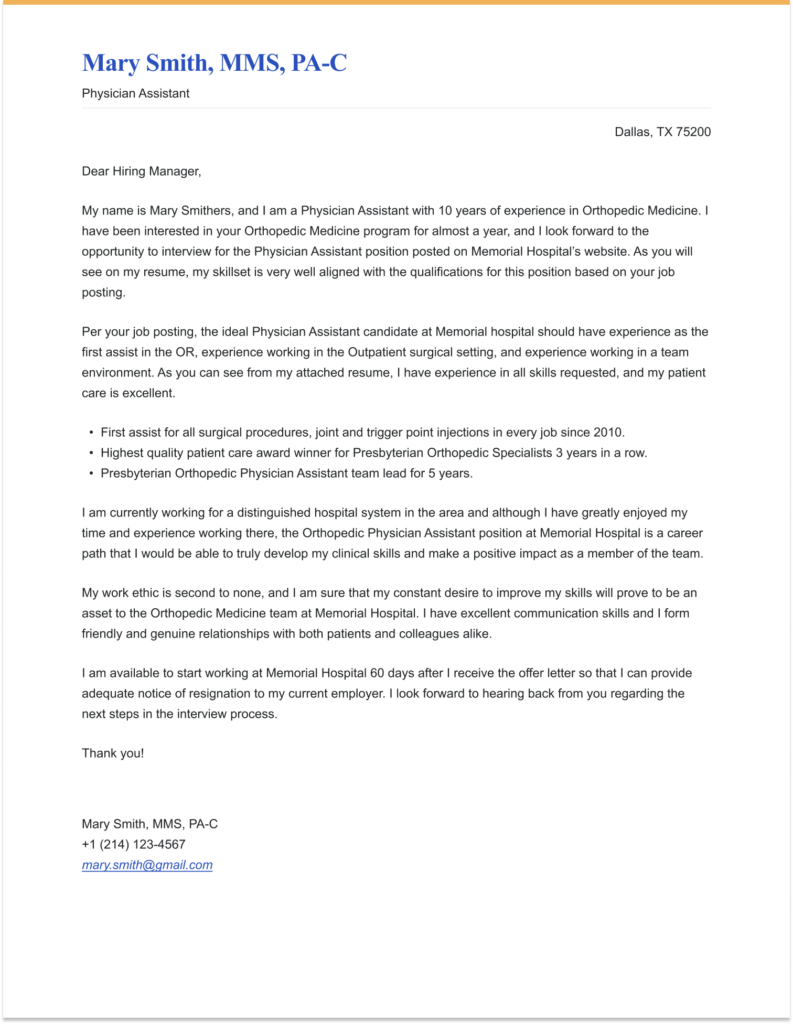
Letter of interest example
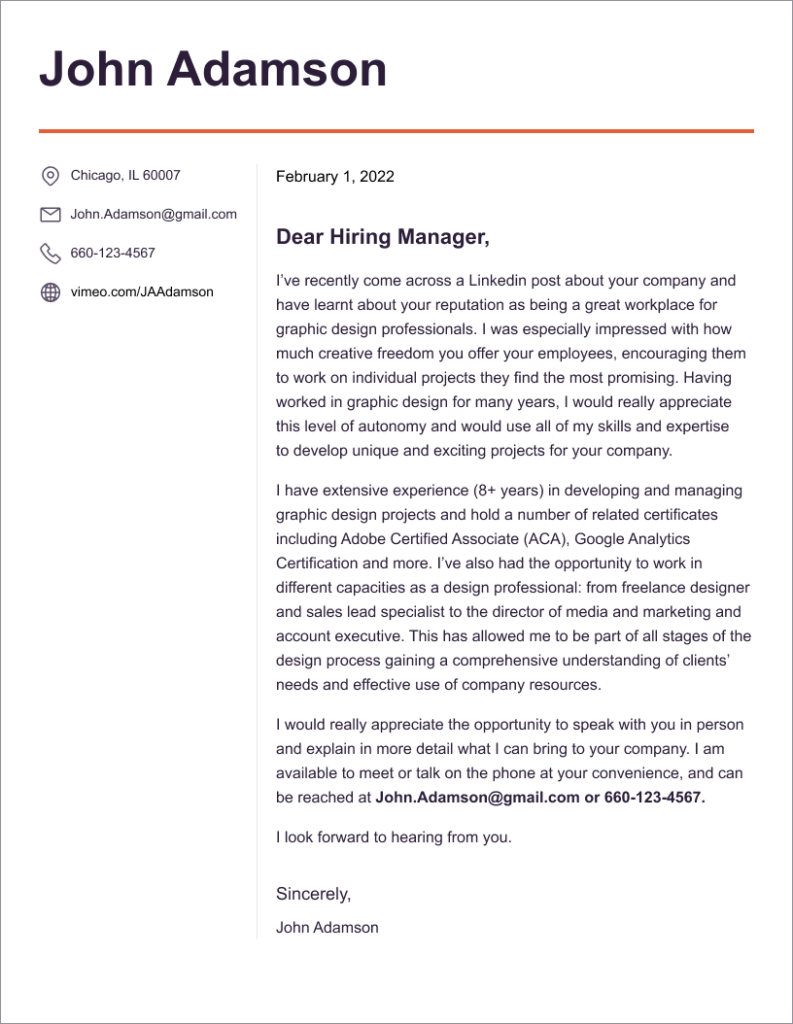
How to write a letter of interest?
As we’ve mentioned above, when you write a letter of interest, you are not applying for a specific position. Instead, you are expressing your interest in working for a particular company. Because of this, your job with the letter of interest is to emphasize that you have the overall skillset that would be beneficial to the company you are applying for. If there is a specific position you are aiming for, you can also try to tailor your letter of interest to that specific post and highlight relevant qualifications.
So, then what is the purpose of a cover letter? Compared to the letter of interest, a cover letter is typically sent alongside your resume ( here’s how to write a resume ) and is used to apply for a specific position — you will typically send the resume and cover letter combo in reply to an advertised job offer. A cover letter is basically a collection of selling points that will get the recruiter interested in reading the rest of your application. Here’s how to write a cover letter .
Let’s see how to best structure a letter of interest
First paragraph: introduction.
You should start off your letter of intent by introducing yourself and explaining what kind of work you do. This is also where you should explain why you are passionate about working for this company and what problems you can help them solve.
You can mention here that you know that they are not currently recruiting — but you may have the skillset and expertise that they wouldn’t want to miss out on.
Second paragraph: work experience
In this paragraph, you will need to pull out all the stunts to impress the recruiter with your experience and expertise. The goal is to make yourself as memorable as possible so that the recruiter will think of you the moment a position opens up.
In this part of your letter of interest, it’s best to focus on concrete achievements you’ve had in previous positions. You can mention the biggest projects you’ve worked on and how they’ve benefited the company, a crisis situation that you’ve handled, the amount of new business you’ve brought to the company — and more.
It’s also a good place to mention your most valued skills (foreign languages you speak, software you can use, personality traits that make you a good professional, etc.).
Third paragraph: call to action
Now it’s time to ask the reader of your letter to act. Think of what kind of outcome you are expecting out of your letter. Do you want them to email you, invite you for an interview, offer feedback on your letter, etc.
Include your most reliable contact information. Even if you have your email and phone in the header of your letter, you can repeat them here.
Tips for writing a letter of interest
When reading your letter of interest, the hiring manager should feel your enthusiasm and passion for working for their company. The tips below can help you make sure your enthusiasm and passion come through in your application.
- Personalize your application . This is one of the most important factors when it comes to the success of your application. Make sure you study the company you are applying for, learn about their mission and company culture. Then, do your best to make these elements come through in your letter of intent to illustrate that you are a good match for the in-company environment.
- Leverage your background . Include specific examples from your work experience that have allowed you to become a better professional. Avoid generalities and be as specific as possible — this will let the hiring professional see that you are genuinely passionate about your job and plan to bring all of your expertise to the new position.
- Explain your motivation . Another important piece of information to include is what has motivated you to write this letter and why you want to work for this specific company. This can include your career goals and how they align with the position you are applying for.
Letter of intent vs letter of interest
Even though these two terms are sometimes used interchangeably, there is actually a slight difference between the letter of interest and the letter of intent. This difference lies in the nature of commitment.
Basically, a letter of intent shows a higher degree of commitment compared to a letter of interest. It states your intentions to work for this particular company — and you may even have a particular role in mind. It’s very similar to a letter of interest in the sense that you should focus on why you want to work for this specific company. However, a letter of intent is more “serious” than a letter of interest and signifies that this company is your first and sometimes only choice.
Summing thins up
- A letter of interest is a letter that aims to express your interest in working for a particular company and inquire about potential employment opportunities.
- A cover letter is a letter that you send together with your resume when applying for a specific position. It serves as a brief introduction of your best qualities and aims to “sell” your application and get the recruiter interested.
- A letter of intent is similar to the letter of interest but presupposes a stronger level of commitment.
We hope that this has been helpful and you are now one step closer to landing the job of your dreams. Learn more about the application process in our blog. Here’s the next read we suggest: Cover Letter vs. Resume: What’s the Difference ?
Letter of Interest Tips, Templates & Examples [A 2023 Guide]
Published: September 12, 2023
In today's competitive job market, a carefully crafted letter of interest is a powerful tool for standing apart from the crowd.

In this post, you’ll learn how to write an outstanding letter of interest that gets you noticed, builds interest, and elicits positive responses.
What is a letter of interest?
Letter of interest vs. cover letter.
How To Write A Letter of Interest
Letter of Interest Example
Letter of interest template.
![letter of interest vs cover letter examples → Click here to access 5 free cover letter templates [Free Download]](https://no-cache.hubspot.com/cta/default/53/3f347702-d7e9-4e59-9fe4-be4cd7bad191.png)
A letter of interest lets a company know you want to work for them in a role they're not currently or openly hiring for.
It focuses on communicating how your skillset might benefit the company so they keep you in mind when (and if) a specific role becomes available.
Sending a letter of interest is a great way to introduce yourself to a company, and it shows them you're willing to take the initiative to reach out proactively.
If done right, this can lead to a coffee chat or an informational interview with the hiring manager of the team you want to work with.
How to Write a Letter of Interest
Your letter of interest needs to be compelling enough to capture the attention of a busy manager and generate enough interest in you as a professional to elicit a response. While this may seem daunting, here's how to do this in 5 simple steps.
Please note that this structure assumes there is a specific team and role you want to be considered for.
1. Briefly introduce yourself.
You must provide context so the recipient understands why you’re reaching out. Failure to do so is a surefire way to end up in the trash or spam folder.
Here are some tips for writing your introduction :
- Keep it concise. You will likely be one of the thousands of emails in their inbox, so they won’t be particularly inclined to sit through a winding introduction.
- Provide context for your letter. The more specific and relevant, the better. If you have a mutual contact, learned of a recent development, or have simply been following them for a while, this is the place you want to highlight that.
- Clearly state why you’re reaching out. Finally, you want to explain why you’re reaching out as clearly and quickly as possible. Don’t dance around the topic; you want to move them to the next section of your letter as soon as possible.
2. Hook the hiring manager with proof that you understand their problems.
To immediately grab a hiring manager's attention after your introduction, you should show that you’ve done your homework and understand the problems they’re currently trying to solve.
A great way to do this is by referencing similar experiences at a current or prior job. This helps you establish a connection and show the hiring manager you can relate to the problem they’re addressing.
It also creates a hook that builds interest and prompts them to read the rest of the letter.
Note: If you don’t have this information, carefully considering the manager's responsibilities is one way to figure this out. What tasks do they own? What are the things that move the needle? Which metrics truly matter?
3. Show them how you’re a standout candidate.
How do you make a hiring manager realize the value you could bring to the team? By emphasizing any unique strengths, experience, and skillset valuable within your industry.
For example, if you have experience using advanced tools or can access hard-to-reach audiences, these can be standout selling points worth mentioning.
Doing this positions you as a candidate who won’t be on the market for long and creates a sense of urgency to respond to your letter.
4. Reinforce your competence with relevant numbers, examples, etc.
It‘s essential to show the hiring manager how you’ve used your skills to solve pain points they might be currently experiencing. This is where you need to use numbers that show how your skill set has driven results in your previous jobs.
By quantifying your results rather than just listing previous work experience, you give the hiring manager concrete data that helps them understand the real-world impact you could make on their team.
5. Confidently request to move on to the next step.
You should again express your interest in exploring upcoming opportunities at the end of your letter. A call-to-action is crucial because it lets the hiring manager know how to get the ball rolling if they’re interested.
Finally, as an additional tip to improve your chances of getting a response, consider connecting with the manager directly.
The ideal way to do this would be via an introduction from a mutual connection; however, if that’s not an option, consider connecting with the manager on LinkedIn.
Don't forget to share this post!
Related articles.
![letter of interest vs cover letter examples How to Write an Internship Cover Letter [Expert Advice & Examples]](https://www.hubspot.com/hubfs/Copy%20of%20Featured%20Image%20Template%20Backgrounds-Aug-21-2023-02-03-52-3390-PM.png)
How to Write an Internship Cover Letter [Expert Advice & Examples]

How to Start a Cover Letter That Gets You Your Dream Job

The 46 Best Cover Letter Examples: What They Got Right

General Cover Letter: 15 Cover Letter Templates to Perfect Your Next Job Application

Is a Cover Letter Necessary in 2024?

The Ultimate Guide to Writing a Cover Letter

Eight Cover Letter Greetings for Every Situation

7 Expert Cover Letter Tips to Get the Job
Five fill-in-the-blank cover letter templates to help you impress recruiters.
Marketing software that helps you drive revenue, save time and resources, and measure and optimize your investments — all on one easy-to-use platform
Letter of Interest vs Cover Letter
Posted on 06 jul 2021.
When applying for a job vacancy, there are two types of letters you can write: a letter of interest or a cover letter . Both letters are meant to express your interest in a job position and serve as your first communication with a potential employer. However, each letter functions differently, and understanding the differences between them will help you convey your intentions better to a recruiter or hiring manager. Let the information below guide you on whether a letter of interest vs a cover letter would be the ideal one to write for your situation.
What is a letter of interest and what is it for?
A letter of interest, also known as a letter of intent, is communication that lets potential employers know that you are available for hire even if there is no open position at the moment. This means that the company hasn’t posted a job opening yet, and you are expressing your interest in advance, along with additional information relating to why you would be an ideal candidate for a job at the company. Since there is no job posting yet, a letter of interest vs cover letter requires a bit of explanation on why you’ve decided to reach out.
How to write a letter of interest
Use this sample to help you craft your own letter of interest vs cover letter. In this example on how to write a letter of interest, take note of how it immediately lets the reader know what the letter is for in the first paragraph.
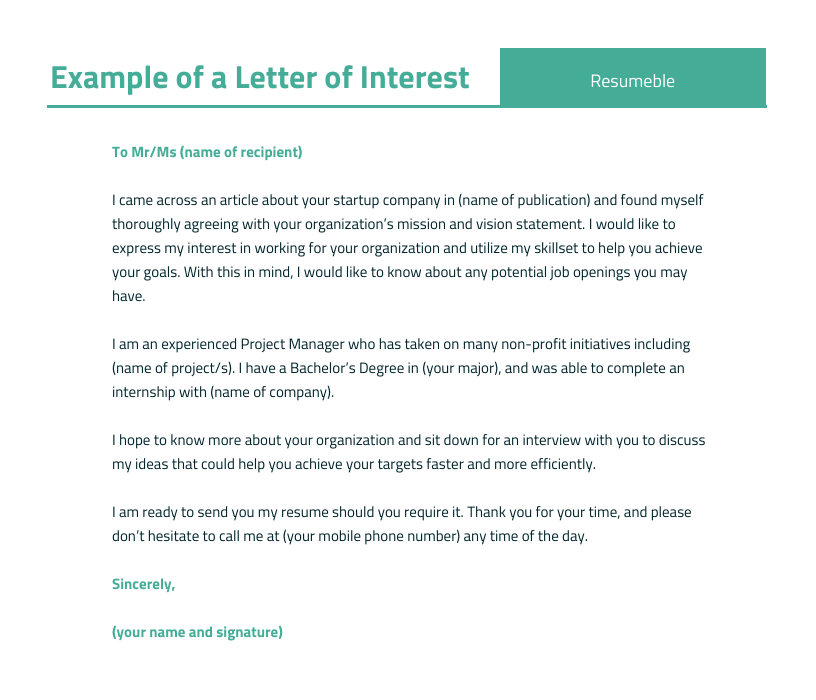
To Mr/Ms (name of recipient)
I came across an article about your startup company in (name of publication) and found myself thoroughly agreeing with your organization’s mission and vision statement. I would like to express my interest in working for your organization and utilize my skillset to help you achieve your goals. With this in mind, I would like to know about any potential job openings you may have.
I am an experienced Project Manager who has taken on many non-profit initiatives including (name of project/s). I have a Bachelor’s Degree in (your major), and was able to complete an internship with (name of company).
I hope to know more about your organization and sit down for an interview with you to discuss my ideas that could help you achieve your targets faster and more efficiently.
I am ready to send you my resume should you require it. Thank you for your time, and please don’t hesitate to call me at (your mobile phone number) any time of the day.
(your name and signature)
Here’s another letter of interest sample:
Dear (name of the hiring manager),
I recently saw a news feature about your company’s innovative approach to automotive manufacturing in a recent news feature, and I am writing to inquire if you have any available job positions relating to logistics and operations management.
I have seven years of experience working as a supply chain manager for (name of company). During my time in this role, I was able to bring down the cost of purchasing raw materials by five percent within six months of taking on the job. I was also able to ensure prompt delivery of said materials through constant communication and follow-up with suppliers. As a result, my company experienced zero manufacturing downtime during my entire term there.
I have attached my resume along with this letter so you can review my qualifications and experience. I would appreciate the opportunity to sit down in an interview with you. Feel free to send me an email at (email address) or message me at (mobile phone number). Thank you for your time and consideration.
Yours truly,
(name and signature)
Should you accompany your letter of interest with a resume?
At a glance, a letter of interest vs cover letter won’t read that much different, but compared to the latter, a letter of interest can be sent on its own and doesn’t need to be accompanied by a resume or curriculum vitae (CV). However, to save time as well as display your initiative, it’s best to send your resume along with your letter of intent.
What is a cover letter and what is it for?
Now that you have an idea of how to write a letter of interest, what about a cover letter? The purpose of a cover letter is to accompany a resume when applying for a job. Since a cover letter is intended for an open position, it does not require an explanation for why it was sent. That said, it holds pretty much the same information contained in a letter of interest including your best qualifications, an explanation of why you would be a good fit for the company, and your desire for an interview.
In addition, the purpose of a cover letter is not just to repeat the information in the resume, but expand on it with specific examples or stories that solidify your skills and experience as applicable to the open job position.
Cover letter sample:
Dear Mr/Ms (name of recipient)
Your company’s job posting for a sales analyst on (name of job market website) caught my attention. I believe that my skills, training, and four years of working experience as a marketing strategist makes me an ideal candidate for the job.
For the past four years, I worked as the Head of Marketing over at (name of company). During my stint, I was able to boost profits by 20 percent and expand the company’s marketing reach by two-fold.
I hold a Master’s Degree in Business Administration from Georgetown University and have updated my skillset through a series of trainings provided by our country’s biggest financial institutions. I also have a certified public accountant license from the American Institute of CPAs.
I have attached my resume herein, containing all the personal information I have regarding my skills, experience, education, certifications, and more. I am eager to discuss my capabilities to contribute to your organization. Please don’t hesitate to contact me at (mobile phone number). I am available during work hours on weekdays.
Kind regards,
Second cover letter sample:
To the hiring manager:
Good day. I am (your name), and I have been a successful accountant with a track record of delivering accurate and consistent financial information. My services have been procured by a range of institutions including (name of firm/s worked for), and I look forward to utilizing my expertise with you.
You can expect me to bring my meticulousness and tenacity to your organization in the capacity of the open Senior Accountant position. Here are some of the qualifications I bring to your company:
• More than 10 years of experience in strategic financing to support commercial business decisions
• A strong commitment to personal and organizational success.
• Solid background in complex financial products, instruments, and derivatives for leveraging accounting information.
• An entrepreneurial mindset dedicated to building strong business relationships and achieving business success.
Aside from my accounting experience, I also hold an MBA degree and have held leadership positions in community organizations. These should strengthen my qualifications to hopefully meet the requirements of the job and further add value to your company should you choose to hire me.
I plan to contact you in the weekdays ahead to discuss some of my ideas for your company. Please feel free to contact me before then through email (your email address) or mobile phone (your phone number). Thank you for your time.
Should you accompany your cover letter with a resume?
Unlike a letter of intent which can be sent on its own, a cover letter MUST always be accompanied by a resume. As the name implies, it acts as a cover to your resume, serving primarily as an introduction to your specific skills, experience, and more. It is meant to encourage employers to read your resume, as well as convince them that you are the right person for the job.
Develop your resume with Resumeble
It helps to send out your letter of interest vs cover letter with a high-caliber resume. Make sure your resume attracts the attention of recruiters and hiring managers by having it written by one of our expert resume writers. Get in touch with us today to learn more about our resume writing services and other services that we offer.
- 7 seconds: this is how long your resume has either to impress or be ignored by the recruiter
- 300+: average number of applications one corporate job opening posted online receives
- 3%: number of sent resumes that result in interviews
Transform your career and beat the odds!
Similar Articles
Posted on : 10 May 2024
Posted on : 06 May 2024
Posted on : 19 Dec 2023
Posted on : 04 Dec 2023

Get a winning resume in 4 days and quickly land the career you deserve
Get a free 48-hour resume review.
- Resume Templates Simple Professional Modern Creative View all
- Resume Examples Nurse Student Internship Teacher Accountant View all
- Resume Builder
- Cover Letter Templates Simple Professional Modern Creative View all
- Cover Letter Examples Nursing Administrative Assistant Internship Graduate Teacher View all
- Cover Letter Builder
- Cover Letter
Letter of Interest vs. Cover Letter
Do your homework
A letter of interest and a cover letter have much in common — they are both letters that job seekers send to employers in hopes of obtaining employment.
But there are key differences you should be aware of, such as the circumstances when one or the other is appropriate, and how exactly they should be written.
What is a cover letter vs. a letter of interest?
The differences between a cover letter and a letter of interest are pretty simple:
- A cover letter is a one-page letter sent with a resume when applying for an open job that is publicly advertised in a help-wanted ad or some other kind of job listing.
- A letter of interest is a one-page letter sent to an employer that is not advertising an open job you want — but you really want to work for that employer anyway, that’s why another name for it is an expression of interest. You’re writing to let the employer know what skill sets you have that appear to match its needs, and to inquire whether there might be any openings that match your qualifications.
So if you’re a lion tamer, and you find a job listing for a circus that’s seeking an experienced lion tamer, you need to write a cover letter to send to the circus with your resume, applying for this specific job opening.
But if you’re a lion tamer and you’re not aware of any job openings in your field — BUT you’re aware of a popular circus that has lion shows and employs lion trainers — why not launch a pre-emptive strike and reach out to the circus first?
That’s where you need a letter of interest (also known as a “letter of intent,” a “letter of introduction” or an “expression of interest”). So what is a letter of interest exactly? It is a way of expressing your interest in working for a specific company in your field that you admire or respect, even if it hasn’t announced that it’s hiring.
Or if you’re toiling round-the-clock for a failing tech startup somewhere in Silicon Valley, perhaps what you’d really like is a job with Google , Facebook or Apple. Maybe you have a specialized skill that could be useful to any or all of these companies, but you’ve scoured their job listings and nowhere do they mention an opening for your specific “superpower.” This is where you need a letter of interest.
Do your best to find the right person to address your letter of interest to. Then, find out as much as you can about that person. A human connection can make all the difference, especially if there is no job posted.
How to write a letter of interest vs. a cover letter
The idea behind a cover letter is pretty straightforward: it provides a personal appeal for the job, showcasing your character, offering reasonable arguments regarding your value as a professional and aims to connect with the hiring manager on a human level. The letter of interest, however, has one additional element in its writing: a direct offer to take you on as an employee, with you as the initiator of this procedure.
Here’s an example to highlight the idea in practical terms:
A private school in Schenectady, New York, has posted an opening for a high school Spanish teacher, and it just so happens that you’re an out-of-work high school Spanish teacher in Schenectady, New York! All you have to do is apply for the job.
But maybe you’re friends with the lady from Peru who currently teaches Spanish there, and she’s told you that the Spanish classes are completely overwhelmed, they’re turning students away, they need another Spanish teacher, and they’re thinking of promoting French teachers from within who don’t really excel in Spanish. So they haven’t yet posted any job opening for a new candidate, but they really need one.
Your letter of interest to the administration of this school, offering your services as a Spanish teacher in Schenectady, might look like a gift from heaven to the principal, superintendent and school board. Why should they post the job at all if they’ve already found the perfect candidate?
The content: letter of interest vs. cover letter
The difference between an expression of interest vs. cover letter occurs mostly in the first paragraph. In one, you are introducing yourself and letting the employer know you’re interested and either know they may have an opening soon or are aware there is no opening. In a cover letter, you are letting the employer know that you are responding to a job listing.
Here’s an example of the lead paragraph of a letter of interest you might send:
Dear Dr. Anderson:
As a high school Spanish teacher with eight years of experience at public schools in New York, I recently learned that your Spanish program might be able to use a new “profesor.” My old friend Lety Álvarez, your current Spanish teacher, tells me that the current demand among your students for Spanish classes exceeds the supply of teachers, and I’d like to inquire whether you might be interested in expanding your staff with a new “maestro de español.”
The rest of this letter might be almost exactly the same as a cover letter, stressing your work experience, educational credentials, certifications and special skills.
Or you might not have any inside intel on a potential job opening, but you’ve identified a reputable company at which you know your skills would be a good fit:
Dear Mr. Stroud:
Having practiced personal injury law for six years in the Bay Area, I’ve met your attorneys in court, sparred with them before judges and even had lunch with a few of them, and I’ve been consistently impressed with the excellence of your team. Although I’m not aware that you’re currently advertising any openings, I’d be honored if you would be willing to discuss whether my qualifications and experience could be a valuable complement to your firm.
Is a statement of interest a cover letter?
No, they may contain similar information overall, but they are used in different circumstances.
Should I write a statement of interest?
Absolutely, if you want to work at a company that does not have a job listed that suits your skills. Otherwise, stick with a cover letter.
What should a letter of interest include?
Like your cover letter, the statement of interest should include your work experience, educational credentials, certifications and special skills, but your first paragraph should explain why you are writing and why you chose the company you did.
A key difference between a cover letter and a letter of interest is that one is solicited and one is not. If an architectural firm posts an opening for a junior architect , then it’s going to expect to receive multiple applications from people responding to the ad.
But if an architectural firm never posted any openings — yet you send a letter of interest out of the blue — then the onus is on you to explain what you like about this company, how it got your attention and why you want to work there.
You’ve got one big advantage: You’re showing great initiative in reaching out to a company you’ve noticed that isn’t necessarily hiring. But you’ve got one big disadvantage: The company isn’t necessarily hiring.
So it’s essential in writing a letter of interest that you research the company in depth, learn everything you can about it, and be prepared to explain why you want to work there.
If you’re looking for places to start the research for your letter of interest or cover letter, here are a few ideas:
- Dun & Bradstreet’s Hoovers : You can try it for free or head to the library.
- Vault : Research companies by name or industry.
- The Fortune 500 and its other lists such as best companies to work for.
- LinkedIn for information on the company and its workers.
- Use your own resources: If you know someone who works at your target company, reach out.
- The company website!
Should I include a resume with a letter of interest?
In a word, yes, you should include a resume with a letter of interest. Why wouldn’t you?
Including a resume is not considered an absolute must when sending a letter of interest, while it is with a cover letter format . But if you pique an employer’s interest with an exploratory letter, wouldn’t the hiring manager want to see more information about your work experience, education and job skills?
It’s best to give your target employer more than one way to review your qualifications — to linger on the thought of whether you might be a possible hire.
Tips on when to write a cover letter vs. letter of interest
| Circumstance | Letter of interest | Cover letter |
| Your friend told you there may be a job opening in her company soon. | ✔ | |
| You saw a job posting you would be perfect for. | ✔ | |
| You have dreamed of working for ESPN all your life, but it doesn’t look like they are hiring. | ✔ |
Covering the basics in a cover letter or letter of interest
Whether you’re writing a cover letter or a letter of interest, some things don’t change. Despite the differences described above, here are some basic rules that apply to both cover letters and letters of interest:
- Use an attractive header that includes your name, occupation, address, phone number and email. Review the free cover letter templates at Resume.io, find one you like and make it your own. You can use these templates for either a cover letter or a letter of interest.
- Use an appropriate greeting, like “Dear Ms. Barr,” that identifies the person responsible for hiring by name. “ Dear Sir or Madam ” is not going to work here —you need to research the company you’re targeting and figure out who makes the hiring decisions.
- Write a provocative introduction in which you introduce yourself, identify the type of job you’re seeking, and provide a compelling preview of your qualifications for this job.
- Use the body of your letter to highlight your work experience, education and skills , and also to identify why you want to work for this company specifically. You can’t just write one cover letter OR letter of interest and send the same letter to 50 different employers.
- Conclude your letter with a final paragraph that contains some kind of call to action, respectfully urging the recipient to get back to you to discuss how to follow up on your proposal.
- Close with an appropriate sign-off, such as “Sincerely” (or an equivalent phrase), followed by a return and your full name.
Whether you need to write a cover letter or a letter of interest, the templates, examples , guides and occupation-specific job-search advice at Resume.io are always available to you.
Best of luck in your job hunt!

Letter of Interest vs Cover Letter: Differences & Which Is Best
A letter of interest is sent as an open job application. Meaning, you're interested in applying for a job even if it’s not being promoted but cover letters…

Cover letters and letters of interest are both for job applications. A cover letter supports your resume and responds to a job description. It’s written for a specific role and company, explaining why you’re a good fit. A letter of interest is more like a cold call—you use it to apply and connect to a particular company you admire, even if they aren’t currently hiring. In it, you focus on why you want to work for them and how you can contribute toward their growth.
Cover letters are for companies actively hiring for a certain position. Letters of interest are for companies that aren’t actively hiring.
A letter of interest is for inquiring about potential roles for a certain company that you’d love to work for. It tells hiring managers how your skills, experience, and aspirations can make you valuable asset.
Use a cover letter when you want to secure a job title that a company is hiring for. But if there's no advertised job opening and you still want to connect, send a letter of interest.
What is a Letter of Interest?
A letter of interest is also known as a letter of intent. It's a formal letter where you express your interest to potentially work for a certain company. You send this to connect with an organization that greatly inspires you. It allows you to inquire about potential career and work opportunities for a specific company, even when they’re not currently seeking new employees.
Letters of interest are typically sent to employers of an organization that isn’t hiring. You most likely won’t find them hunting for candidates for your job position.
You might want to use a letter of interest to introduce yourself to your dream company. There’s a chance it could lead to opening an opportunity.
What is a Cover Letter?
Cover letters are typically sent with your resume.
The aim of your cover letter is to secure a job interview by explaining how and why you’re a good match for the position that the company is hiring for. This means highlighting your professional skills and experience in relation to the job description.
The Difference Between a Cover Letter and Letter of Interest
The biggest difference between a cover letter and a letter of interest is their purpose.
- Letters of interest focus on your intentions and why you want to work for the company.
- Cover letters focus on why you’re the best person to hire for the job position they’re hiring for.
A letter of interest is a documented letter that’s sent as an open job application. You’re expressing interest to work for a certain company, but usually not for a specific role. You do this by highlighting your skills, experience, and interests.
Letters of interest aren’t limited to one type of job position. You could get matched to an alternative or similar role. It all depends on your skill set and how the organization can get the most value from you.
In contrast, a cover letter is sent as a targeted job application to secure a position at a company. They target a job vacancy. They’re also sent along as a secondary document to complement your ATS resume .

The Essentials of a Letter of Interest
In terms of the format for a letter of interest, it’s pretty much similar to a cover letter as it’s made up of the following:
- Header section
- Opening paragraph
- Closing paragraph
What makes it different from a cover letter though, is the contents within each section.
You’re not writing for an available vacancy. Instead, it’s tailored towards a specific position that isn’t currently being advertised or promoted. Therefore, there should be more emphasis on why you’re interested in working for them specifically and what makes you a good company fit.
Letter of Interest Sample

In the above cover letter template , the candidate states the position and company they’re interested in. Then, they introduce themselves by providing a brief background of their professional skills. They also make it clear why they’re making an application.
At this stage, hiring managers aren’t actively looking for a new employee. That’s why it’s important to set the agenda and make the purpose of your letter clear.
After the opening paragraph, they begin to focus on showing why they match the job position they seek. This is shown throughout the letter while displaying interest by describing the value they have to offer in phrases such as:
- “My ability to work as a team player… have allowed me to excel in the field of Human Resources”
- “What I would bring to the position includes…”
- “I would come to work every day determined to fulfill Amazon’s vision…”
- “In review of your team’s objectives…”
In the closing paragraph, they’ve tied it all back to the company objectives. You’ll notice too that they’ve referred back to the company’s mission statement alongside their business culture.
This time, we’ll analyze how cover letters are written and pick up on some key points.
You’ll find that there are no huge differences between the two and that they’re both pretty similar to one another.
The Essentials of a Cover Letter
The format of a cover letter includes:
Compared to a letter of interest, you’re more focused on explaining why you’re best suited for the role. There’ll usually be more emphasis on the job description criteria rather than the company values (although this is an area that should still be focused on).
Cover Letter Sample

Compared to the letter of interest example, the format is quite similar.
You’ll notice the cover letter still talks about where the candidate’s enthusiasm comes from.
However, it doesn’t revolve around the candidate’s interest and the company values as much. It revolves more around how and why they’re the best person for the job. As opposed to focusing on the company culture, it mainly focuses on their skills and what to write in a resume for work experience .
How to Write a Letter of Interest
This is how to write a letter of interest:
- Do your research into the company’s background.
- Address the hiring manager or head of department.
- Start with a hook by introducing yourself and expressing why you look up to the company.
- Showcase your skill set by highlighting your top career achievements and significant projects you worked on.
- Make a direct statement about how your background allows you to uniquely contribute to the company.
- Express your availability for new opportunities and willingness to learn.
- Politely inquire about potential job openings or career opportunities.
- Thank the reader for their time and consideration.
- End with a formal sign-off.
Your letter of interest lets employers know how you can uniquely contribute to their organization and help them reach their goals. Sharing an emotional story on how the organization inspires you isn’t always enough to get a response or secure a position—you’ll have to emphasize key skills that would strongly benefit the company.
1. Know the Background Information
The background information includes the following:
- Company culture
- Mission statement
- Social media profiles
- Team members
It also includes being familiar with some of the content the organization has posted. This is important for not just showing you’re genuinely intrigued by what they’re doing. But to match their values.
2. Use the Background Information in Your Letter
It’s time to put your research to use.
For example, greet your employer by their name. On top of getting their attention, it indicates your level of interest alongside your research skills.
Since you’re inquiring about working for an organization that isn’t actively hiring, you need a good reason why you’re making the application. That doesn’t just mean endlessly telling them about yourself and flattering them. It’s about showing how you’d be a committed asset that can help them reach their goals.
3. Share Where Your Interest Comes From
What was the driving factor that made you reach out?
This is a good way to get your reader curious from the start of your letter. Yes, you know a thing or two about them…
But the next part is to focus on what that’s got to do with you.
For instance, was there a recent post or project you saw that’s relevant to your skillset or career goals? Essentially, you’re using some of the details from the previous step with your reason for wanting to work with them to hook your hiring manager in.
4. Clarify Your Interest
You’ve already mentioned where your interest comes from.
Clarifying it means making it clear what you’re after (i.e. seeking a job opportunity) and why you’re after it. Be as specific as you can because it’s likely that they’re receiving all types of requests left and right.
That said, do keep your letter of interest concise. Respect the company’s time and get straight to the point.
5. Showcase Your Career Highlights
You’ve shown you know your stuff about the company.
The next step is to showcase your career highlights to prove you’re someone that’s a good fit. Without any evidence of how you’d be beneficial, it won’t make yourself compelling enough to consider hiring.
So, sell yourself. Demonstrate how you’d be valuable to their organization by sharing the following:
- Workplace achievements
- Qualifications
6. Link Back to the Company’s Needs
How will your strengths help to meet the needs of the company you’re applying for?
Reflect on what the company is working towards. It’s effective to link your skills back to their mission as well as what they’re looking to achieve. If you emphasize the fact you know what it takes to get results, it can make you stand out as a professional.
7. Make the Next Steps Clear
State how you’d like to proceed. That could mean following up via email or requesting a meeting to discuss further.
Try to avoid using standard generic phrasing to reiterate your interest. On top of exuding self-confidence, it can impress your employers by the fact you’re not only skilled. But that you’re passionate enough about wanting to be of service.
Do Letters of Interest Actually Work?
Yes, they work. It’s a good route to take when you’re looking to make a targeted application for a dream company you want to work for. To maximize your chances, you’ll need to show you’re an ideal fit in terms of both professional skills and company culture.
Should You Use a Cover Letter or Letter of Interest?
If you’re applying for a specific position in the company that isn’t currently available but you’re open to future opportunities, use a letter of interest. But if you’re applying for an open job vacancy, use a cover letter . Even if they’re not requested by your employer, you can still send them along with your resume.
In other words, only send a letter of interest to a company that isn't marketing an available job vacancy. Compared to a cover letter, this type of application is more long-term.
Tips for Writing a Letter of Interest
Showing no enthusiasm for a potential career opportunity doesn’t leave a good impression on your hiring manager.
At the same time, you don’t want to sound too desperate. That’s what the tips below are for.
Align With The Company Culture
There’s better chemistry and engagement when employees are fulfilled. It also helps to cultivate a positive environment, which leads to better work performance.
Part of the criteria of an ideal employee is someone that cares about the company’s success. These are the people who are passionate about achieving the set targets and goals. They’re also the type of people who are more likely to stay.
Use Your Personal Background
Outside of your professional summary , do you have other relevant life experiences?
Personality traits or hobbies that align with the job and company values position you as someone who matches the role. It helps you stand out because you have something new to bring to the table.
State Your Intentions & Motivations
Why are you applying for this specific company?
Let your employers know what you’re after. When your resume objectives correspond with the company’s goals, it can spark an interest in wanting to read the rest of your application. Even better if you could support your answer with previous experiences and accomplishments that prove your value.
Action Verbs and Power Words
Weak action verbs resume are words that convey action. It’s an easy yet effective way to add spice to your letter. These emphasize your impact and contributions when describing previous duties and responsibilities.
Likewise, resume buzzwords to avoid make certain points stand out.
Both types of words can improve your letter by making it twice more engaging when used in the right context.
Include a Personalized Call to Action
Personalize your call to action at the end of your letter by tying it back to your intentions and the company’s needs.
Here are a few example sentences:
- “I believe that my proven experience and passion for digital marketing will…”
- “I am confident that my skills, experience, and enthusiasm will be a great asset to…”
Then, clarify the next steps moving forward.
For instance:
- “I look forward to the opportunity to discuss how my experience would be…”
- “I am available to discuss this position in more detail at a convenient time”
Use Rezi AI Cover Letter Writer to Speed Up the Process
Do you need a cover letter? If so, you can use Rezi AI Cover Letter Writer .
Here’s how it works:
- Enter the name of the company you’re applying to.
- Add the job title you want to highlight.
- List key skills that are relevant to the role.
- Press “AI Writer Ready.”
Then, you’ll have a full cover letter generated based on your background.
Explore Rezi 🔥 Comes with 5,000 AI Credits, and is free forever, no credit card required.
Or, see below for a live demonstration of how to instantly generate a cover letter or letter of interest.
Let’s recap on the differences between a cover letter and letter of interest:
- Cover letters are used to apply for job openings at a company. They’re tailored to the company’s job description and cultural values.
- Letters of interest are used to inquire about career opportunities at your dream company. They’re focused on showcasing how your skill set and interests can make you a valuable contributor.
- A letter of interest isn’t as commonly used as a cover letter. Although they may not immediately lead to an interview, they can help you get your foot in the door and make a connection.
While there’s a clear distinction between their purposes, both will still highlight your value as a professional.
Don’t be afraid to send your application details to a company that’s not currently recruiting. There’s no harm in trying to get in front of your dream company. At the very least, you’ll get to introduce yourself with the possibility of getting a positive response.

Astley Cervania
Astley Cervania is a career writer and editor who has helped hundreds of thousands of job seekers build resumes and cover letters that land interviews. He is a Rezi-acknowledged expert in the field of career advice and has been delivering job success insights for 4+ years, helping readers translate their work background into a compelling job application.
Ready to build your resume?
Join over 3 million people who use Rezi to take control of their job search.

How To Write A Letter Of Interest (Sample Templates Included)
Mike Simpson 0 Comments

By Mike Simpson
Updated 5/9/2022

We’ve all been there… You’ve combed all of the job boards in search of the perfect job but, alas, haven’t been able to find anything that’s a great fit. Fortunately, there’s still one more lifeline you have at your disposal, and if used properly, it can end up being one of the most rewarding things you do for your career.
So what is this secret weapon I speak of? A letter of interest, of course!
With a letter of interest, you can connect with more opportunities. Here’s how.
What Is a Letter of Interest?
A letter of interest is a letter you send to your target company, letting them know that you’re interested in working with them. It’s also a way to see if there are any potential job opportunities that match up with your skillset that aren’t openly advertised, allowing you to tap into the hidden job market . Since over 80 percent of jobs go unadvertised, that’s a big deal.
Generally speaking, a letter of interest can be sent at any time regardless of whether a company is actively hiring, as it isn’t sent in response to a specific job opening. Rather, it’s a way of introducing yourself to a company you’re interested in and seeing about the possibility of employment with them.
Letters of interest are sometimes also called letters of inquiry for just this reason. You’re inquiring if they might have a position for you. This is the part of the equation that can be very rewarding. Rather than applying to jobs that aren’t a stellar match, you get to handpick the companies that you contact. Pretty awesome, right? We think so.
Letter of Interest vs. Cover Letter
In many ways, a letter of interest is like a cover letter. However, when it comes to a letter of interest vs. cover letter, there are differences, too.
Generally speaking, cover letters typically target specific, open jobs. With a letter of interest, you’re reaching out even though there isn’t an advertised vacancy.
Since that’s the case, cover letters are more targeted. They speak to a specific position, referencing details from the job ad. Letters of interest are a touch more general, highlighting your strengths in a field and how you could benefit the company in a broad sense without connecting it to a particular role.
How To Write a Letter of Interest
Much like any correspondence you send any employer, you have to make sure that a letter of interest for a job is well crafted and appropriate. You’re introducing yourself to a potential employer, so you want to put your best foot forward.
A poorly written letter of inquiry can potentially make any possibility of working at your dream job with your target company a solid “NO” in the “Do you like me?” boxes. That means you need to ensure you take the time to do it right.
If you do it correctly, a letter of interest is a great way to demonstrate your ability to market yourself and highlight your best qualifications. Plus, it can lead to real opportunities.
Tailoring Your Letter of Interest
As you’ve no doubt seen in our other blog posts, we’re very big on tailoring. Your letter of interest is another opportunity (actually, the first opportunity!) for you to find out exactly what the company is looking for and present yourself as that person.
When applying for a specific position, you have the benefit of using the job description to comb through in search of the qualities that the company puts a lot of value in. But since this is a letter of interest, you are traditionally not applying to a specific position, so you need to be a little more creative. Since that’s the case, you need to do some hardcore research, taking the time to learn about the specific type of people the company likes to hire.
Researching a Company Through Their Online Presence
There is a virtual treasure trove of information available about a company when you peruse its various web properties. Since you’re looking to learn more about the people who get hired to work there, it’s wise to spend time digging into each web property in search of clues.
Quite often, there are “day in the life” videos featuring employee interviews that are incredibly useful. You can also go to the employee list on the company’s LinkedIn page and go through the profiles to see what experience and skills they have.
Putting the “Tailoring Method” To Work
Once you have figured out the types of people that your company hires, you want to do your best to emulate them in your letter of interest. Choose a few skills and abilities that you want to highlight that align with what your research revealed about the employees. Then, start thinking up a quick supporting statement for each one that you use. After all, if you can’t back it up, there is no point in even mentioning it.
Once you have done the research and have uncovered the qualities that you want to showcase, you are ready to begin writing your letter of interest.
Best Letter of Interest Format
Half of the battle is making sure that you nail your letter of interest format. After all, you won’t exactly be making the best first impression if your letter is a convoluted mess that is hard to read and makes no sense.
Here is the basic format for you to follow, which you can see in the three examples we use below:
Your Contact Info
No surprises here. Name, address, telephone number, email, and your website. If you’re not comfortable providing your address or any other information, don’t worry about it. Just make sure they can get in touch with you!
Use a traditional format for the date, writing out the month, followed by the day, and ending with the year.
Company Contact Info
Please don’t start the letter with “to whom it may concern.” Do the research and find a specific person to address the letter to. A good place to start would be a hiring manager, another person in HR, or even better, the manager or director of the department you envision yourself working in.
Opening Paragraph
Introduce yourself and your intentions.

Qualification/Experience Paragraph
Attack this paragraph with two purposes in mind:
- Showing how you add value
- Demonstrating you have the qualities they value
This is your time to shine. Keep it brief and succinct, picking two to three qualities and supporting them with facts.
Closing Paragraph
Thank them for their time and offer your availability for an “informational interview” at their earliest convenience.
What’s an informational interview? It’s both an opportunity for you to learn more about the company and the various positions within the company AND a great way for you to meet the right people in the organization you are interested in.
More importantly, it’s an opportunity for you to let your award-winning personality shine, and if executed properly, it can help you land a job at the company of your dreams!
Stick with “regards” or just “sincerely,” add your name, and you’ll be good to go.
Common Mistakes
Many people fall into the same traps and make some of these classic letter of interest mistakes. Do your best to avoid these if you want to get your foot in the door!
1. You don’t send a letter of interest at all
Too often, people find a company they’d like to work for and just blindly send in a resume with nothing else attached. Sure, it might be a super impressive resume, but if you don’t include a letter of interest discussing why you’re sending it in and who you are, you might as well just be throwing those resumes away.
On the flip side…DO NOT FORGET TO INCLUDE YOUR RESUME!
2. Sending your letter of interest out with a generic heading
As mentioned above, you need to take the time to do a little digging and find out to who you should address your letter. Sending out a generic “Dear HR Director” or “To Whom It May Concern” isn’t going to win you any brownie points.
3. Not saying what you can do for them, but what they can do for you
Regardless of why you’re interested, remember, it’s about what you can do for them, not what they can do for you! Tell them what you can do to help them achieve their goals.
4. Not tailoring your letter
If you’re going to show initiative by writing a letter of inquiry, make sure that initiative extends to your research as well! Supercharge your letter by highlighting qualities that align with the company values, increasing your odds of success.
5. Being boring
You’re shooting for your target company and your dream job, so don’t simply make a list of all of your skills and abilities. Instead, make sure to dazzle them with what you bring to the table, adding something extra to generate interest.
6. Being too long
Your goal is to catch their attention and leave them wanting more…which means short, sweet, and to the point. Keep your letter under a page.
7. Being sloppy
There is no excuse for typos or sloppy writing. You’re trying to get an informational (or even a full-on) interview, so get these basics right. Check. Double-check, and then check again!
8. Not following up
Yes, you should treat your letter of interest exactly like and job application and follow up.
Sending a letter of interest is a proactive step, so keep being proactive! Ask for a job interview, an informational interview, or a meeting HR director to talk about potential roles you might fill. Then, follow up on that request.
A Few Great Letter of Interest Sample Templates
Now that we have that out of the way, let’s take a look at a few examples so you can get your own started! Here are three different scenarios from which you might decide to write a letter of interest to a company.
Choose the best letter of interest sample that fits with your situation, but don’t simply copy the example word-for-word. You need to input your own experiences and personality, so think of this letter of interest sample as more of a template that will guide you to success!
Letter of interest for your target company following a positive encounter:
Your Address
Your City, State, Zip Code
Your Phone Number
City, State Zip
Dear (remember, make this specific!):
I recently had the opportunity to interact with a few members of your customer support team while conducting research for a project. My time with them was brief but memorable. Your team was friendly, poised, and professional, and I was impressed with their willingness to help and their quick responses to my questions.
It is clear customer satisfaction is an integral part of your company’s core values. It is for this reason that I am writing to you. I feel my own personal values and special talents might benefit your customer service department. I believe in personal accountability and integrity and have always made sure to act in a professional and ethical manner. Attention to detail is similarly a priority, ensuring that my work is nothing short of my best at all times.
If I were to be hired by your company, I would be dedicated to delivering the same kind of high-quality customer service I myself experienced. Both a motivated self-starter and an enthusiastic team player, I feel I’d be an exceptional fit.
In the hopes of scheduling an interview with you or answering any questions you might have, I will call you [upcoming date]. Please do not hesitate to contact me with any questions at any time at [phone number] or email, [email address].
Thank you for your time in considering my qualifications.
Letter of interest following a write up of the target company:
Dear Mr./Ms. Last Name,
While reading through a trade publication last week, I came across an article outlining why your company has been recognized as one of the best places to work in the country for tech professionals. Your entire focus has been on making sure that your company is not only a leader in the industry but also an innovator, pioneering new and emerging technology. For this reason, I am sending you my resume in the hopes that I might be able to join your team.
I have worked exclusively within the technology field for the past five years. During that time, I’ve worked in a variety of positions, giving me experience in accounting, including finance and budgeting. I was also responsible for inventory control and vendor relations. I have been instrumental in my past positions in bringing new and emerging technology into our business processes, and I am actively looking for opportunities with companies that would allow me to continue that practice. I believe strongly in always being at the forefront of technological development, a perspective I feel your company has, too.
As a team leader, I am proud of the fact that not only have we never missed a deadline but that we have come in under budget while delivering superior results every time. I firmly believe in the integrity and professionalism of my work, striving to ensure that every aspect of what I do also upholds the company’s core values.
I will call you on [date] to answer any questions about this letter or my resume in the hope of scheduling an interview. If you prefer, please contact me by phone [phone number] or email, [email address].
Letter of interest for a recent graduate looking for work:
I read about [company name]’s retail management training program in [publication name], and I would like to inquire about the possibility of openings. As a recent graduate from the University of California with a degree in Business Management, I am very interested in a career in retail management, and think your program is a perfect match for both my skills and my experiences. I have over five years of retail experience, including time as a Sales Associate and a Manager.
Along with this letter, I have included my resume, which contains additional information on my experience and skills. I would appreciate the opportunity to discuss the training program with you and to provide further information on my candidacy. I can be reached anytime via my cell phone, [phone number], or by email at [email address].
Thank you for your time and consideration. I look forward to speaking with you about this exciting opportunity.
Putting It All Together
Now, you should know all you need to about the amazing letter of interest! Remember, each sample letter of interest above is meant to serve as inspiration. When you create yours, remember to keep it targeted, short, and professional. That way, you increase your odds of getting a response.
And as always,
FREE : Job Interview Questions & Answers PDF Cheat Sheet!
Download our " Job Interview Questions & Answers PDF Cheat Sheet " that gives you word-for-word sample answers to some of the most common interview questions including:
- What Is Your Greatest Weakness?
- What Is Your Greatest Strength?
- Tell Me About Yourself
- Why Should We Hire You?
Click Here To Get The Job Interview Questions & Answers Cheat Sheet

Co-Founder and CEO of TheInterviewGuys.com. Mike is a job interview and career expert and the head writer at TheInterviewGuys.com.
His advice and insights have been shared and featured by publications such as Forbes , Entrepreneur , CNBC and more as well as educational institutions such as the University of Michigan , Penn State , Northeastern and others.
Learn more about The Interview Guys on our About Us page .
About The Author
Mike simpson.

Co-Founder and CEO of TheInterviewGuys.com. Mike is a job interview and career expert and the head writer at TheInterviewGuys.com. His advice and insights have been shared and featured by publications such as Forbes , Entrepreneur , CNBC and more as well as educational institutions such as the University of Michigan , Penn State , Northeastern and others. Learn more about The Interview Guys on our About Us page .
Copyright © 2024 · TheInterviewguys.com · All Rights Reserved
- Our Products
- Case Studies
- Interview Questions
- Jobs Articles
- Members Login
- Best Resume
- Letter of Interest vs Cover Letter – Detailed Comparison
Letter of Interest vs Cover Letter – Detailed Comparison
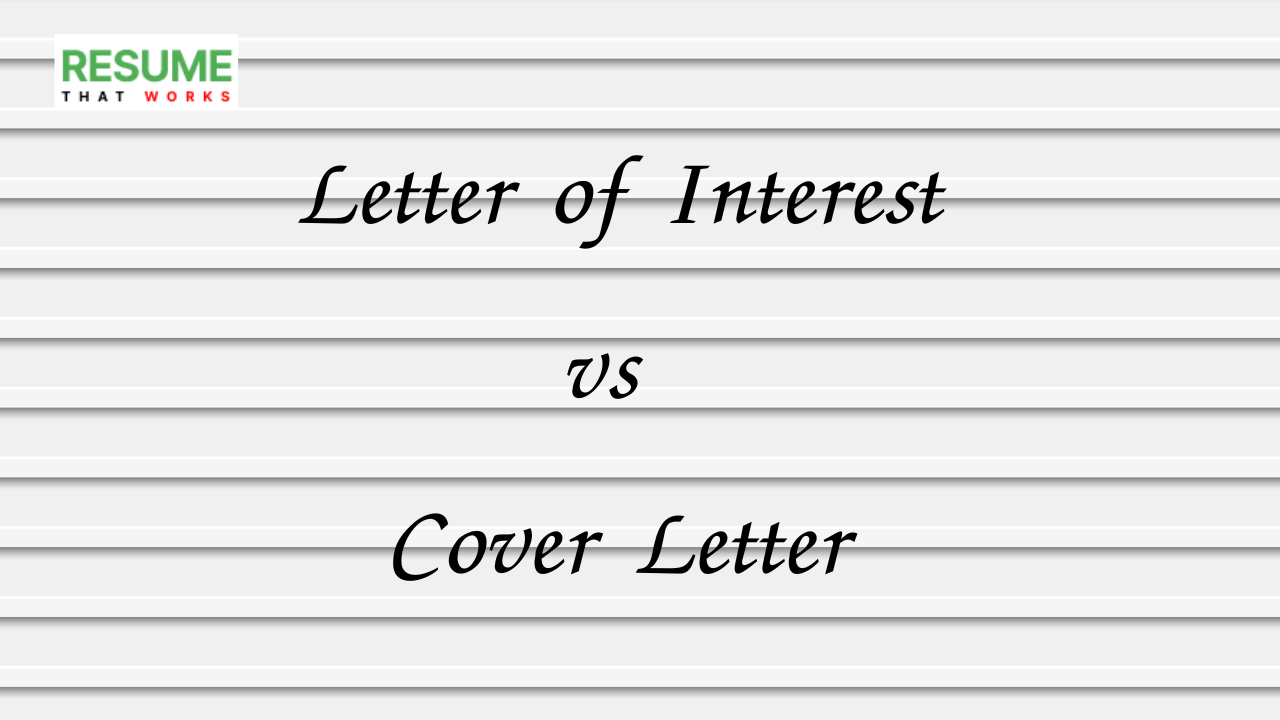
Cover letters and letters of interest are two essential documents that job seekers use in the job search process.
A letter of interest is typically used as a way to introduce yourself to a potential employer, showcase your qualifications and skills, express your admiration for the company or organization, explain why you are interested in the position and demonstrate how you can contribute to their success.
Cover letters, however, are more traditional and often used to accompany resumes when applying for jobs. They provide detailed information about your experience and qualifications that relate directly to the position being advertised.
Both types of documents should be crafted with care. They should be error-free and written in a professional manner that reflects the individual’s knowledge of the organization they are applying. Wondering when and how to create a letter of interest or a cover letter? Here is everything you need to know to create an amazing letter of interest.
What is a Letter of Interest
A letter of interest is a type of document used by individuals to express their admiration for a particular company or organization and showcase their skills, qualifications, and abilities. It is typically used as an introduction to introduce the candidate to the potential employer and explain why they are interested in the position. This type of document should be written professionally and with care, as it will reflect the individual’s knowledge of the organization or company.
What is a Cover Letter
A cover letter is a traditional document used to accompany resumes when applying for jobs. It provides detailed information about the candidate’s experience and qualifications that are specifically related to the job they are applying for. This type of document should be carefully crafted, with all relevant details included, as it will allow an individual to demonstrate how their skills can be beneficial for the particular position being advertised.
What difference Between a Letter of Interest and a Cover Letter
When deciding between a letter of interest versus a cover letter, applicants need to consider what they want to achieve. While both documents can show off an applicant’s skills and abilities, cover letters usually have a greater focus on specific job details such as duties and requirements while letters of interest generally focus on more general topics such as career objectives, experiences, or qualities that make an individual stand out from other candidates.
Knowing the difference between these two types of documents can be essential during a job search process. Understanding the purpose of each document and content can help candidates make effective decisions when choosing which one will best serve their needs.
Crafting them carefully, making sure they include all relevant information about yourself, and conveying enthusiasm for your desired position can go a long way towards landing one dream job!
Letter of Interest Templates
Here is a plain text interest letter template that you can use as a basic example of how you can create one for yourself.
Letter of Interest Example – Plant Text Sample 1
Here is an example of a detailed letter of interest template:
Dear [Name], My Name is [Your Name] and I am writing to express my interest in [Position, Company, Program, or Project]. With [Relevant Skills/Qualifications/Work Experiences] I believe I could make an excellent addition to your team. [Explain why you are interested in the opportunity, highlighting relevant skills and qualifications] I have attached my resume for your reference. Please feel free to contact me if you have any questions or wish to discuss my experience further. Thank you for your time and consideration. Sincerely, [Your Name]
Dear [Recipient’s Name],
My name is [Your Name] and I am writing to express my interest in the [position/company/project] you have recently advertised. As a [qualification(s)/experience(s)] I believe that I am an ideal candidate for this role.
I am particularly interested in the opportunity to work on [project detail] as it is an area that I am passionate about and has the potential to make a real impact within the company. Additionally, I possess the necessary skillset and expertise to help drive success with this project. For example, I have previously worked on [relevant experience].
Besides my qualifications and experience, I also bring enthusiasm and commitment to any position for which I am considered. My dedication would ensure that any project is completed with attention to detail and a high level of accuracy.
Thank you for your consideration of this opportunity, and please do not hesitate to contact me if you require further information or if you would like to discuss my candidacy further.
Sincerely,
[Your Name]
Cover Letter Templates
Cover letter example – plain text sample number 1.
Dear [Hiring Manager],
I am writing to submit my application for the [Position] vacancy you recently posted. I am confident that my experience and qualifications make me an ideal candidate for this role.
Throughout my career, I have acquired considerable knowledge and expertise in the areas of [relevant skills] which makes me a perfect fit for the position. I believe the combination of my experience and education makes me uniquely qualified to contribute to your team in this capacity.
I have enclosed my resume with additional information detailing my qualifications. I would be thrilled to discuss how I can bring value to your organization at an interview or over the phone. Thank you for your time and consideration, and I look forward to hearing from you soon.
Cover Letter Example – Plain Text Sample Number 2
Dear [Name of Hiring Manager],
I am writing to apply for the position of [name of the job] with [company name]. As someone passionate about [field or industry], I believe my qualifications, hard work ethic, and enthusiasm make me uniquely suited to excel in this role.
As a professional with [number of years] years of experience in the field, I have developed a thorough understanding of the skills needed for success in this position. My background includes working in numerous positions that have equipped me with invaluable knowledge and insight into the details necessary for achieving success. During my tenure as [role/position], I was able to utilize my problem-solving skills to develop innovative solutions and proactively address any issues that arose. In addition, I am adept at utilizing modern technologies such as [software name] to maximize team performance and efficiency.
I am confident that my qualifications and experience make me an excellent candidate for this role. Please feel free to contact me if you would like any additional information regarding my application. Thank you for your time and consideration.
Main Differences Between a Cover Letter and a Letter of Interest
Following are the five main differences between a letter of interest and a cover letter:
- Purpose: A letter of interest is used to introduce oneself to an employer and express admiration for a company or organization, whereas a cover letter is tailored to the specific job one is applying for.
- Length: Letters of interest tend to be shorter than cover letters, as they are focused on introducing oneself rather than providing detailed information about work experience and qualifications.
- Content: A letter of interest will usually contain more general information such as career goals and qualities that might be beneficial to the company or organization, while a cover letter contains more details about the applicant’s background that relate directly to the job being applied for.
- Formatting: Cover letters generally have more formal formatting requirements such as headings or margins, while letters of interest may not need these extra elements.
- Tone: The tone of both documents should remain professional, but in a letter of interest it may be slightly less formal due to its introduction-style nature.
What Differentiates a Cover Letter from a Letter of Interest
What is the purpose of a letter of interest.
A letter of interest is a type of correspondence used to express interest in a particular position, company, program, or project. When writing a letter of interest it is important to keep the tone professional yet enthusiastic. Begin by introducing yourself and explaining why you are interested in the opportunity. Make sure to provide evidence for why you are an ideal candidate for the role and include any relevant qualifications or experiences that are applicable. Finally, end your letter with a polite thank-you and offer further information if needed.
How to Write a Letter of Interest?
If you’re thrilled with what you learn, see if any of your insider connections at the company can be beneficial to you.
For instance, you may have a friend (or even be connected to someone through your own connections) at that particular company – just check out their profile on LinkedIn. Your acquaintance can provide the hiring department with an endorsement of your qualifications and character. Or they might give you some insider intel such as if there are any issues the organization is currently facing (which could prove advantageous for both parties).
How to Write a Cover Letter?
Writing a cover letter can seem intimidating, but it doesn’t need to be. Start by introducing yourself and explaining why you are the perfect fit for the job. Speak about any relevant qualifications or experience that you have and make sure to highlight any special skills or abilities you possess. Finally, end your letter with a powerful conclusion that expresses your enthusiasm and thankfulness for the opportunity.
What is the Purpose of a Cover Letter
The purpose of a cover letter is to introduce yourself to an employer and provide information about your qualifications, experience, and background that make you a good fit for the job you are applying for. A cover letter gives employers further insight into who you are as an applicant, and what qualities or key skills you possess and allows them to make an informed decision on whether or not they would like to invite you for an interview.
Resume That Works!
Most recommended online cover letter & letter of interest writing service.
We hope these letters of interest and cover letter samples and tips have given you some insights on how to craft one for yourself. If you dont have the time and energy to do so then you can hire a professional cover letter or letter of interest writing expert from Resume That Works .
Resume That Works is an online resume-writing service that has been helping job seekers for more than a decade. They have a team of career experts along with professional cover letter writing professionals. They have the skills and experience that are required to help you land the job of your dreams. So what are you waiting for? Place an order right now and get a professional executive assistant cover letter online!
How long should a letter of interest be?
A letter of interest should be kept to one page. Your letter should provide enough information to demonstrate your enthusiasm and skill set without appearing overly long or overwhelming. Start with a brief introduction that outlines why you are writing the letter, be sure to include any relevant qualifications or experiences, and end with a polite thank-you.
Is a letter of interest a resume?
There is a big difference between a letter of interest and a resume. A resume is a document that enlists all your professional skills, experiences, and qualifications. A letter of interest adds a bit of personality to your job applications; it is meant to present yourself as a person and tell why are you interested in something.
Written by Simon W
Related articles.

Top Resume Trends to Watch Out for in 2023

Resume Writing for Career Changers: Tips and Strategies

How To Create Resume For Sales Executive

Career Advice
- Resume and Cover Letter
How Do Letter of Interest and Cover Letter Differ from Each Other?
To make your job search successful, you must have the right tools to help boost your efforts to land your target job. Hence, apart from your usual resume, CV, or any other primary document, adding another document that would strengthen your application would be your best bet.
That said; how do you know which kind of job search tool is best for you? Learn how you can choose between writing a letter of interest vs cover letter and browse examples below to guide you.
Letter of Interest vs Cover Letter
Right off the bat: The main difference between these two job search tools is their purpose. Putting it simply, a letter of interest serves as an open job application. Meaning, you’re interested in working and applying for a specific position in the business that matches your background even if the role isn’t announced or posted in public.
On the other hand, a cover letter is often sent along with a CV or resume with the aim to support your application. This letter is for a job opening that they’re hiring for.
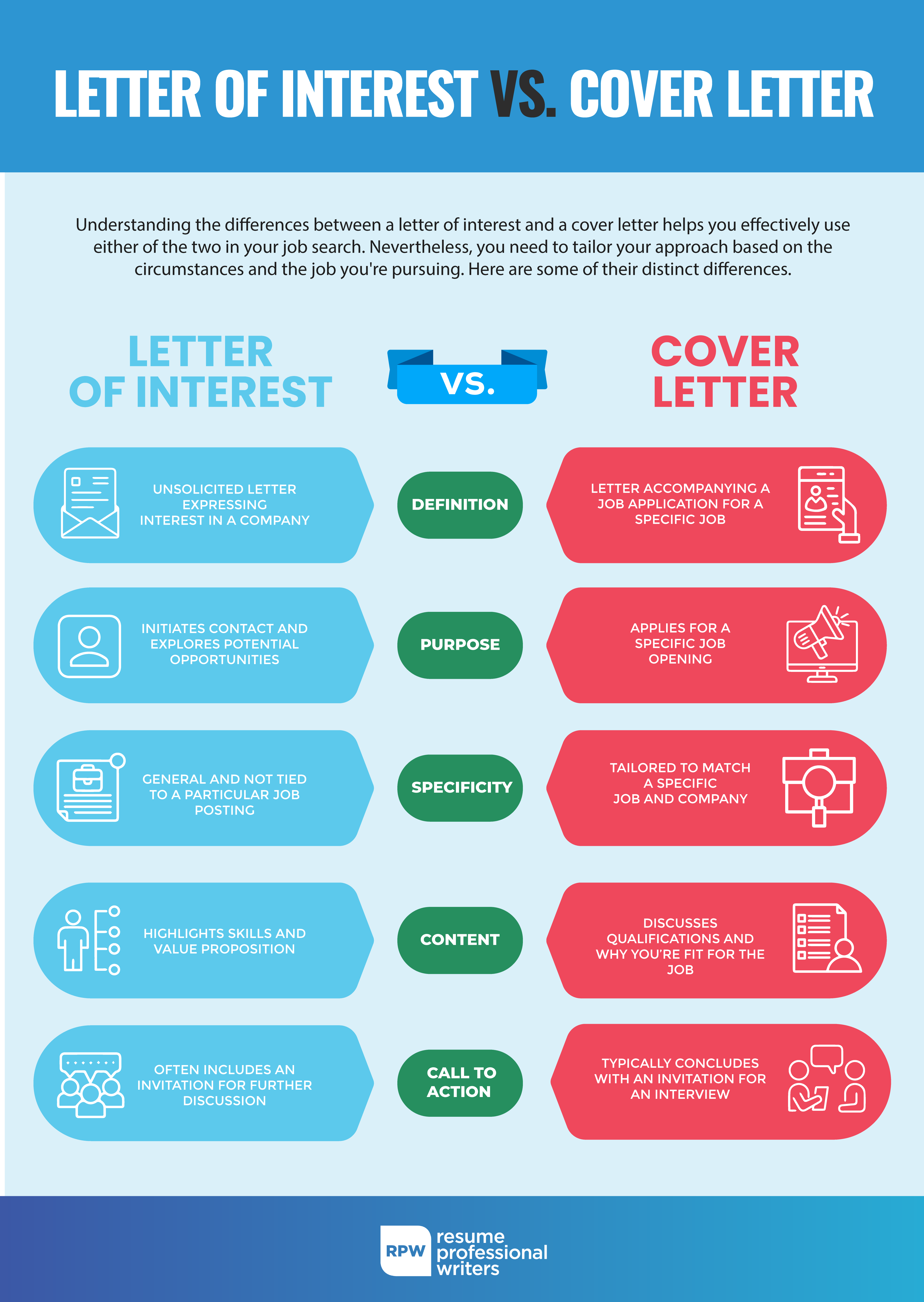
Feel free to download the image above for more accessible information.
Which One Should You Use?
As a keen job seeker, it’s important that you ensure you’re choosing the right formats for the job search tools you’ll craft and send based on your needs.
Choosing between writing a letter of interest vs cover letter should be simple as long as your goals are clear and aligned with your current career level.
Nevertheless, it’s best for you to write a letter of interest when:
- You discovered an intriguing business that may be a good fit for your long-term career goals.
- You’ve heard that your target company had a recent business expansion and you feel you’ll be a good member of their team.
- You’ve been closely watching a unique firm that you think is a good fit for your skill set, background, and values.
- A contact from your network informs you of roles for which they’re hiring, but which they haven’t posted for the public yet.
- You’re keen in introducing yourself to a company with a promising background and culture with the hopes of being one of the first to hear about future openings there.
Meanwhile, craft a strong cover letter when:
- You’re responding to a public job posting.
- You’re vying for an internal job opportunity .
- You aim to add a supporting tool to your resume.
With all these, look at it this way: Your letter of interest highlights your aims and reasons why you want to work for the business, while your cover letter details why you’re the best fit for the role you’re vying for.
How to Write a Letter of Interest
Apply these foolproof tips and tricks in writing this type of letter.
1. Write a strong intro.
Start strong by opening your letter with a brief yet catchy intro. In 1 to 2 sentences, you may state your name and outline your background or your main expertise. Another way is to state your interest to apply for or explore job roles within the business.
2. Explain the aim of your letter.
It’s just right that you detail why you’re writing to the company. Further, you may choose to use this chance to pinpoint the factors that make the business appealing to you.
3. Describe how you’re fit for the company.
Once you’ve researched about the culture, values, and scope of the business, it’s time for you to describe how your background, traits, and skills will help add to the success of the firm.
4. Highlight your background.
Allot a paragraph or two for your key work history and core feats. This is where you further show how your background validates your expertise.
5. End with a direct statement in your closing.
Conclude by thanking the reader for their time and effort in checking your letter. Also, state that you’re open for an initial interview so that you can introduce yourself more. Besides, this type of interview will help the recipient to get to know more about your background, whether a job post is open or not.

Letter of Interest Sample
Now, how should you apply these tips and how should it look like? Here’s a sample that you can refer to:
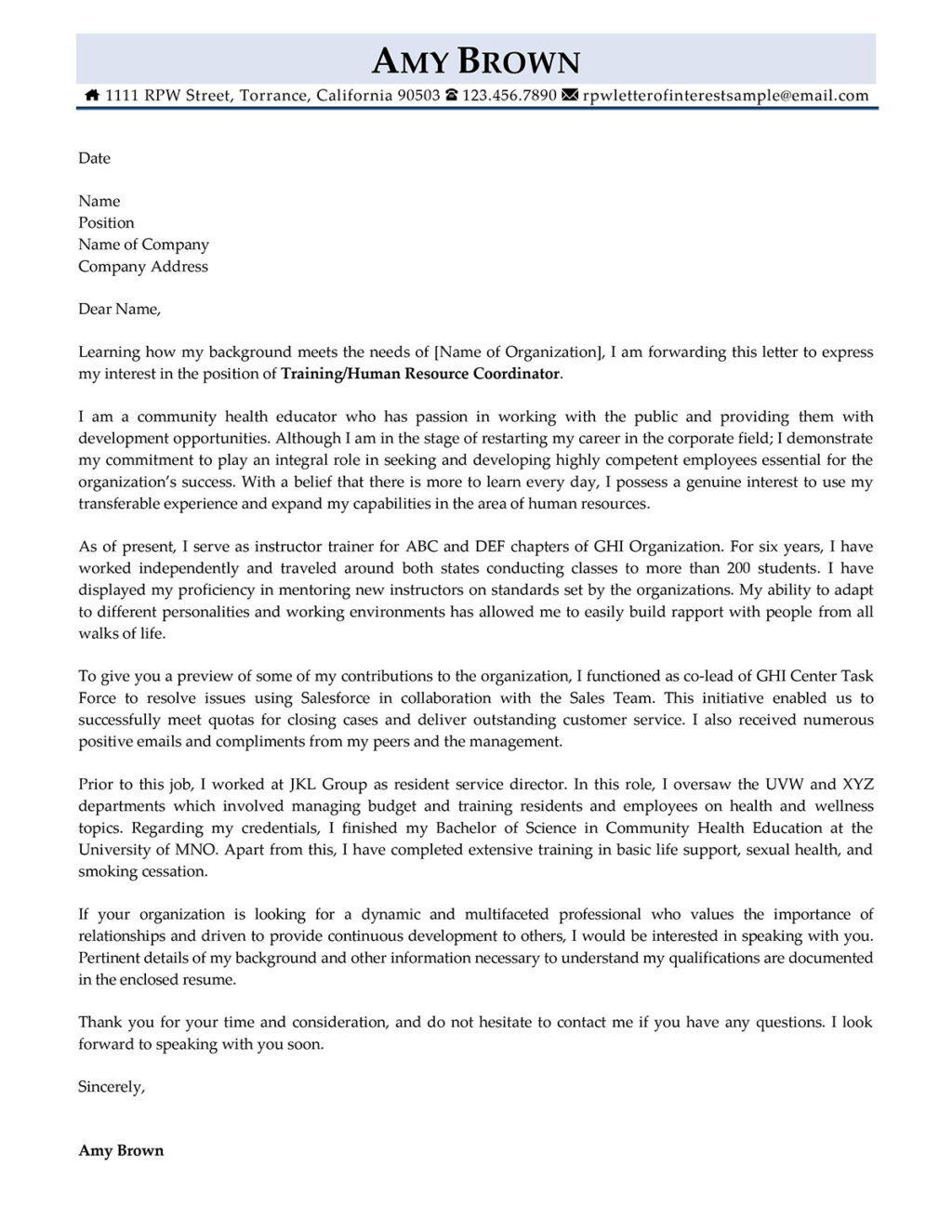
How to Write a Cover Letter
If you think a cover letter suits your case better, follow these steps as you write your own:
1. Introduce yourself.
Similar to how you must write an intro for your letter of interest, make sure your cover letter has the basic details of who you are and the role you’re applying for.
2. Explain why you’re the best fit for the job.
Make smart use of your time in researching about the business, what they stand for, and what they do. With this, relate your feats to what the business needs and prove what you can bring to the table.
3. List your top achievements.
To further highlight your work history and how you performed as an employee, pick your most fitting achievements and mention them on your cover letter. This will help the hiring manager or recruiter to assess how well your match the job requirements.
4. Compel the recipient to read your resume.
Lastly, include a call-to-action (CTA) statement to encourage your reader to review the resume you attached along with your letter. This is in the hopes of landing the interview and increasing your chances of getting hired.
For further reading, check out this in-depth guide on cover letter writing .
Cover Letter Sample
With the tips you should heed, use this as your guide as you write your cover letter.
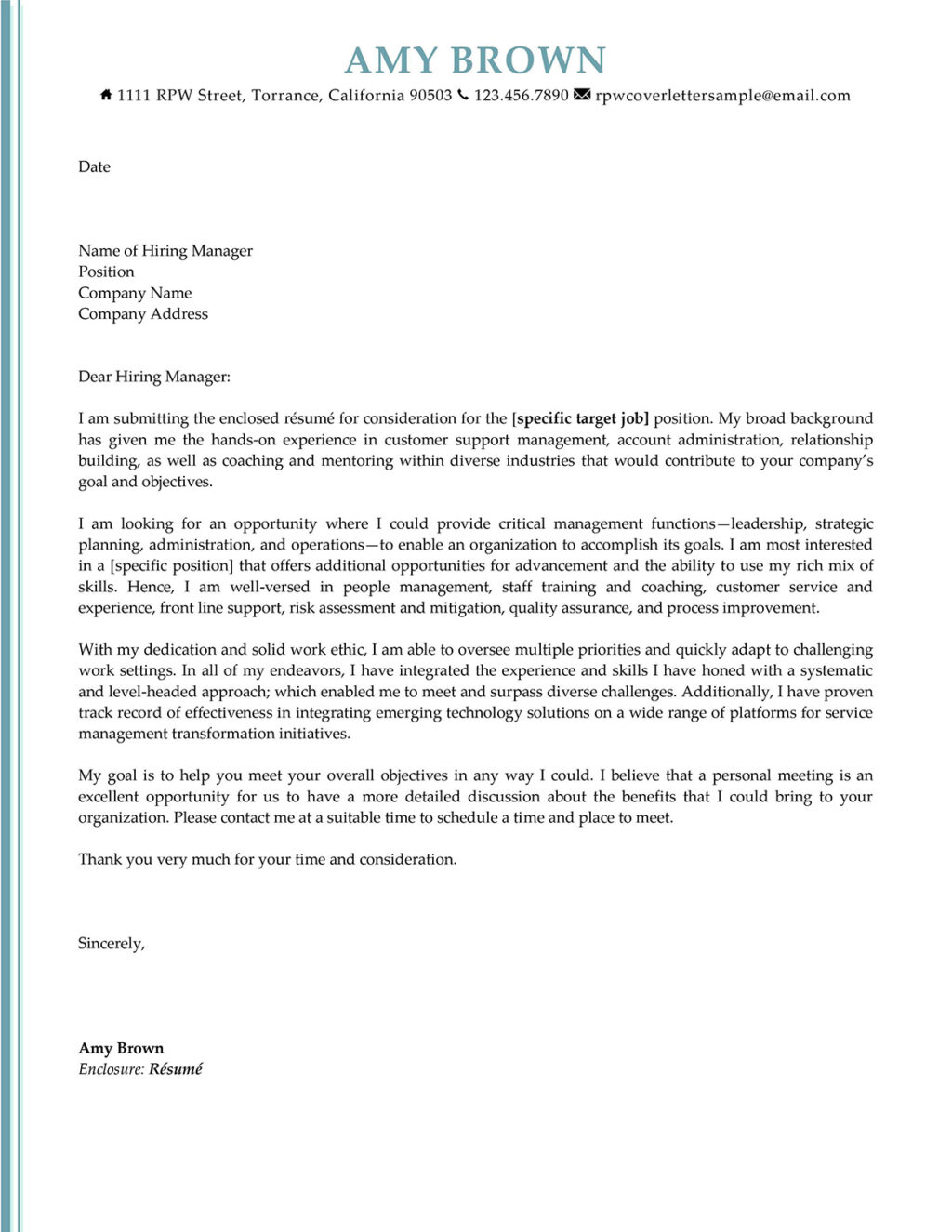
Let Experts Take Care of Your Job Search Tools
While you’re busy focusing on all the core stages of your job search and career journey, it might get tedious and challenging to write and choose an effective option between letter of interest vs cover letter.
The good news is: You should never deal with these woes alone. Entrust your job search tool needs to career experts! Resume Professional Writers offers a wide range of career services including job search tools such as cover letter and letter of interest among others. Get ready to be noticed by potential employers through your eye-catching and impactful application! For more queries and tips, you may contact us or browse our career blog .
Recent Post

The Rise of Temp Agencies Navigating the Gig Economy

Our Resume Services in Action: Job Landing Success Stories

The Importance of Sending a Thank You Email After Interview

5 Best Resume Writing Services for Career Changers That Can Effectively Highlight Your Skills
Related post.

8 In-Demand Freelance Jobs You Can Pursue in the Current State of Remote Work

Show off Your Best Face: A Guide on the Best Job Interview Makeup

Career Advice for High School Students: The Key to Achieving Career Goals
Resume services, job application samples, subscribe to our newsletter.
Sign up to get the latest on sales and more...
Be the first to know about the latest in career trends and exclusive promotions.
How to Write a Letter of Interest (With Examples)
In This Guide:
What is a letter of interest, what makes a good letter of interest, how to write a good letter of interest, four good letter of interest examples, key takeaways.

Since graduation, you've been dreaming about working for that company. Unfortunately, you can't find a single job advert.
Heard about the hidden job market? Rumor has it that 70 – 80 % of all job positions remain unadvertised .
How do you go about applying for a role that may or may not exist?
Write a letter of interest to make a statement and connect with recruiters in the company.
The letter of interest may not lead to an immediate job offer, but it will raise your career prospects, helping you remain on top of the application pile.
Have we won you over? Read on to get inspired by:
- What is a letter of interest, and when should you send one?
- Letter of interest vs cover letter : what is the difference?
- KISS (Keep It Short and Simple) and other ground rules to writing your letter of interest;
- The 10 must-have elements that make up the structure of your letter of interest.
- Real-life examples and templates to write your letter of interest in the blink of an eye.
A letter of interest goes under many names, like prospecting letter, expression (or statement) of intent (or inquiry).
Whatever the case, the letter of interest helps you get one foot through the door of your dream company – to see if you'd be a good fit for any potential job openings.
The letter of interest is a formal introduction, demonstrating initiative and enthusiasm, qualities hiring managers value.
When should you write a letter of interest?
Send a letter of intent, if you have recently:
- read an article about the company;
- found a social media post about a new business or expansion;
- seen that the organization accepts resumes for further consideration;
- heard about a job opening that hasn't been announced.
When you choose to write a letter of interest, you are setting yourself apart from the rest by taking the initiative in finding a job within a specific organization that brings you excitement.
I enjoy getting letters of interest, they show true enthusiasm, career focus and determination, and don't happen often.
Jessica Hinkle, state government worker, and hiring manager
Letter of interest versus cover letters
Here are the similarities between the letter of interest and the cover letter . Before writing either, you need to research the organization to add an element of personalization.
Within both letters, you'd need to introduce yourself and answer why your experience would be an asset to the company.
Now, let's look at how a letter of interest differs from a cover letter.
The letter of interest expresses your broader interest and flexibility to adapt to a potential role.
On the other hand, a cover letter highlights why you’re the best candidate out there for the job.
The letter of interest is unsolicited – it is more general and may not be directed to a specific hiring manager or a particular job.
Some job openings require a cover letter – it should note the exact job title and company you're applying for, as well as a greeting to the hiring manager.
The main focus of a letter of interest is to point out why you admire the company (its culture, mission, and values) and how you'd contribute to its future success.
A cover letter may contain similar elements but would be more centered on communicating your skills, experience, and achievements that are relevant to the job.
A good letter of interest should excite the hiring manager or department head to meet you. Thus, leading to an informal, informational interview, or helping you to stay on top of everyone's mind when a new role becomes available.
So, before you start writing, here are the six things that benchmark all successful letters of intent.
Research the company
Dive into information about the company and industry via press releases and news articles; the corporate website and mission statement; LinkedIn and other social media platforms.
Remember that the more specific, company-relevant details you can disclose in your letter of interest, the more likely you'd impress with your knowledge.
Personalize your greeting
Start your letter of interest with a personalized salutation to a human resource specialist, currently recruiting in the company, or a department manager, you'd wish to work with.
Avoid generic greetings like “To whom it may concern” or “Dear sir/madam”.
Instead, take the time to find the relevant contact and note the department head’s or manager’s full name and job title.
Attention-grabbing hook from the get-go
Here's the cold, harsh truth about the letter of interest – no one is expecting your application or has any obligation to respond to your message.
Prove that your profile is worth the company's time by showing you've done your homework on the organization and the specific value you can deliver.
Refer to your research to look out for noteworthy, recent projects or business updates (e.g. opening a new store or entering a new market).
In your letter of interest, point out how you see yourself driving this enterprise ahead by showing your past track record of success.
Professional tone and language
When writing your letter of interest, double-check your grammar and spelling to show you pay attention to even the smallest details.
Use a polite tone to balance your enthusiasm and confidence, without sounding too cocky or pushy. Yet, avoid sounding too much like a robot, as the company may think you've written your letter of interest with AI.
Often humor helps you to stand out, but, in this case, we suggest you avoid cracking jokes, as they might not resonate with your readers.
Persuasive and specific offer
Aim to stay on target by explaining exactly why you'd fit the company culture.
Use LinkedIn to research current employees working in the role you wish to have and discover their key skills.
Select up to three of your strengths to tell the story of how your experience aligns with the ideal candidate profile.
Remember to always include your achievements by a tangible metric (e.g. percent increased) to be even more specific.
Keep your letter of interest to the point
How likely are you to read a letter of intent that just pops out of the blue in your mailbox one day and that goes on and on and on…
Not very likely.
Your persuasion letter should be up to a page long (around 200 – 300 words). That is around three paragraphs that should be single-spaced.
Follow the standard business letter format to highlight how you can contribute to the company.
Your resume should be attached to your letter of interest, painting the full picture of your experience.
Enhancv's resume builder allows you to create a perfectly streamlined document that will further elevate the impact of your letter of interest. If you think your resume needs a refresh, follow our guidelines in the article, How to Write a Great Resume .
When sitting down to write your letter of intent, there are two rules of thumb you need to follow.
- Rule number one – you should focus on what you have to offer rather than what you're seeking in a new employer.
- Rule number two – the goal is to pique interest, not provide a detailed account of your career history.
Having that in mind, let's get down to writing your letter of interest!
The structure of your letter of interest
- Header – include your name, and contact details (email, phone number, and address). Also, the contact's name, job title, and company name. Don't miss out on the date.
- Greeting – take the time to find out who you're writing to and always personalize your salutation.
- Introduction – to grab the reader's attention with relevant information.
- Body paragraph – to show how you'd bring value to the organization.
- Closing paragraph – aim to end with a call to action.
The introduction paragraph of your letter of intent
Kick off your letter of interest with a brief introduction of your current job title or relevant experience to the company.
After this first sentence, note the specific job or department you'd like to be a part of and briefly summarize why.
Next, highlight why you're drawn to the company (e.g. their big-picture vision, products or services, strategic growth, etc.). If you can identify any specific challenges they face, jot them down in this sentence.
End your introduction with a statement that highlights that you know there are no current openings, but you believe your expertise would be a valuable asset.
The body of your statement of interest
Use the body of your letter of interest to make a lasting impression so that the recruiters remember you when a role becomes available.
While it may be challenging to highlight why you'd be the perfect fit for a non-specific role, there are a few approaches you can take.
Identify two or three specific issues within the company or department.
Describe how your current job equips you to address these challenges, by focusing on your accomplishments, paired with tangible metrics (e.g. numbers of products sold in a month, etc.).
Show how your achievements and skills align with the company's needs.
- Emphasize hard skills (or the technologies you can use) and soft skills (your people and communication talents ) that bring value to the company.
- Select notable accomplishments that set you apart from other industry professionals. Use bullets to draw attention to them, and add numbers to show the results of your success.
- Highlight your specific experience or qualifications in a niche, that the company values. If you are a recent graduate, with no experience, use your volunteer experience or extracurricular activities to make your case.
The closing paragraph of your persuasion letter
Finish your letter of interest with a call to action, inviting the hiring manager to reach out to discuss potential opportunities.
Thank them for their time and consideration and suggest exploring ideas in a live meeting (e.g. an informational interview or a casual coffee chat).
Emphasize your flexibility to accommodate their schedule, and make it clear that you look forward to exploring the opportunities further.
Don't forget to add how they can get in touch (via email or telephone).
Ready for some real-life examples of writing your letter of interest? Let’s explore one that is completely wrong:
Notice how Mr Statham has focused solely on his experience and achievements? He hasn't pinpointed in any way the company he is applying to – its culture, unique problems, or goals.
The constant "I" comes across as a bit arrogant, creating an endless account of his success.
Here is how Mr. Statham can improve his letter of interest:
From the get-go Mr. Statham expresses his interest in a specific role, highlighting his unique skill set and why he chose the company.
The body of his letter of interest highlights two key achievements with tangible metrics.
The ending includes a call to action.
In the next part of this guide, we’ll present you with four real-life industry professionals’ letters of intent.
Take note of their initial mistakes and how to make their writing sound more specific to match the company.
Project manager letter of interest
What happens when you send out a generic-sounding letter of interest?
The candidate doesn’t build his case as to how he could contribute to the company. Mr. Allias’s letter of interest sounds generic and robotic, at best.
Here is how he edited it:
Mr. Allias’s letter of interest works now as it’s:
- Personalized and targeted to the reader.
- Shows exactly why he’s interested in the company.
- Highlights relevant experience , skills, and noteworthy accomplishments.
- There’s a clear call to action at the end.
Data scientist letter of interest
The letter of intent is where you should avoid being overconfident:
Notice how Ms. Tookes’ letter of intent:
- Comes across as overconfident and arrogant.
- Focuses too much on her individual achievements.
- Offers no insights as to how she succeeded.
Want to see how she fixed her persuasion letter?
Reading Ms. Tookes letter of interest you can see exactly why she’s interested in a role at the company and can immediately pinpoint the impact she has had in her past roles.
In the conclusion paragraph, the recruiter can immediately find her contact details and reach out, when a suitable job becomes available.
Lecturer letter of interest
You want your letter of intent to hint at your attention to detail, so double-check your spelling, before sending it across.
Apart from the spelling errors, due to potentially being pressed on time, Mr. Jonson’s letter is vague and doesn’t clearly state the role he is interested in.
Check out how Mr. Jonson improved his letter:
Recruiters can now understand Mr. Jonson’s specific academic background and expertise, and see the value his experience can offer.
QA Engineer (Intern) letter of interest
You may not have relevant experience, yet as a junior professional, you have other skills and qualities that would help you stand out.
For starters, don’t be too friendly in your letter of intent:
Marcie Darcy’s letter is too informal and doesn’t highlight her skills or achievements. It sounds like a chat, you’ve lifted off of Meta.
Here’s a more formal version of Ms. Darcy’s letter of interest:
Ms. Darcie shows enthusiasm to join the company - by pinpointing the company’s relevant niche service - and at the same time stays professional.
She refers to her education for key technologies and projects, showcasing the value she could potentially bring about.
- Send a letter of interest, when there are no open roles in the company you want to work for. Meanwhile, use the cover letter to answer a specific job advert.
- The letter of interest is based on plenty of research on the company so that you can personalize it (especially the greeting) and catch the readers' attention (with how you'd bring about value).
- Use your letter of intent's introduction to state why you're interested in the company.
- In the body paragraph, pinpoint either two to three company problems, you can fix, or two to three skills or accomplishments, that would be useful to the company.
- End with a call to action, where you provide your availability for an informational interview or a coffee chat.
- Cover Letter Guides
The Resumes of Chernobyl
How to explain employment gap on resume, what are red flags on a resume, overqualified for a job tips to overcome this hurdle, how to answer the interview question, “why do you want to work here”, how to write responding to recruiter email [templates included].
- Create Resume
- Terms of Service
- Privacy Policy
- Cookie Preferences
- Resume Examples
- Resume Templates
- AI Resume Builder
- Resume Summary Generator
- Resume Formats
- Resume Checker
- Resume Skills
- How to Write a Resume
- Modern Resume Templates
- Simple Resume Templates
- Cover Letter Builder
- Cover Letter Examples
- Cover Letter Templates
- Cover Letter Formats
- How to Write a Cover Letter
- Resume Guides
- Job Interview Guides
- Job Interview Questions
- Career Resources
- Meet our customers
- Career resources
- English (UK)
- French (FR)
- German (DE)
- Spanish (ES)
- Swedish (SE)
© 2024 . All rights reserved.
Made with love by people who care.
- Knowledge Base
- Free Resume Templates
- Resume Builder
- Resume Examples
- Free Resume Review
Is a letter of interest same as a cover letter?
If you are a job seeker confused between a letter of interest and a cover letter, you are not alone.
While both these letters are formal letters written to a recruiter you want to work for, the purpose of these letters is different.
A letter of interest is written to express your interest in working for a company before the company advertises a job opening.
Whereas, a cover letter is written as an accomplice to support your resume for a specific job vacancy at a company.
So, to address the question directly, a letter of interest is not the same as a cover letter.
Read on to learn more about a letter of interest vs a cover letter and related questions like the following:
- What is a letter of interest for a job?
- What is a cover letter for a resume?
- What is the difference between a cover letter and a letter of interest?
- What is an example of a letter of interest?
What Is a Letter of Interest?
If you have a dream company that you would love to work for, you don’t have to wait for them to advertise a job vacancy.
Yes, even before they have an opening, you can write to the company expressing your genuine interest in working for them.
This is exactly what a letter of interest is.
A letter of interest, also known as the statement of interest for a job or letter of intent, is an official letter that lets the hiring manager know you are interested in working for the company and explains why you would be a great addition to their team.
It further describes your qualifications, skills, experiences, and which position you see yourself working in at the company.
You can also explain your reasons for wanting to work for the company in your letter of interest.
Also read: How to write a letter of intent for a job?
What Is a Cover Letter for a Resume?
A cover letter is a formal document that you send with your resume when applying for a specific job vacancy.
The purpose of a cover letter is to align your skills and experiences with the job requirements and showcase yourself as the ideal candidate.
Although there are some similarities between a letter of interest and a cover letter, like in both these letters, you need to highlight your skills and experiences, the latter is tailored to a job description.
A cover letter also needs to describe how you will benefit the company and provide a more insightful glimpse into your career trajectory.
Also read: How to write a cover letter for a resume?
What Is a Letter of Interest vs Cover Letter
Now that you have learned the difference between a statement of interest vs cover letter based on their definitions, it’s time to look at some of the key differences between the two.
Given below are some aspects in which a letter of interest vs cover letter differs:
The Purpose
The sole purpose of a letter of interest, as the name suggests, is to express your interest in working for a company in a position that is not yet vacant.
The focus of the letter is to explain why you’re interested in the company and role and why the recruiters should consider your candidacy when and if any vacancy comes up in the near future.
Whereas, a cover letter’s purpose is to support your resume for an advertised position to make the recruiters see how and why you are the perfect fit for the position.
The Content
Since a letter of interest is written with more focus on the company than the role, the content of this letter differs from a cover letter.
This means that you need to write a letter of interest before a job vacancy is posted. Hence, there is no job listing or job description that you can tailor your letter to.
Whereas, while writing a cover letter, the content is tailored to fit the job description provided in the listing, and only a couple of lines are focused on the company.
Given that a letter of interest is written before any vacancy is advertised, when exactly should you be writing and sending it?
Can you randomly write a letter of interest and send it to a company? Not exactly.
Listed below are a few scenarios when you can send a letter of intent:
- You come across a company that matches your work values and skillset
- You hear about a future opening at a company you are interested in working for
- You get an internal referral for a job opening that hasn’t been advertised yet
- You get information about the expansion of a company you’re interested in
Meanwhile, a cover letter is sent along with a resume only when there is a job vacancy that has been advertised and you meet the recruiters’ requirements.
Also read: How should you write an email cover letter in 2022?
Letter of Interest Sample
For your reference, given below is a sample of sample letter of interest for a job:
Dear Ms. Ridder,
My name is James Cameron, and I’m a graduate of New York University with a Bachelor of Arts in Marketing and Communication. I read an article in Forbes magazine about the expansion of Hudson Corporation and am extremely interested in learning more about the possible job openings that might come up following the expansion.
I’m seeking an entry-level position in the marketing department of your company as I believe that I have all the right qualifications and skills to become a contributing member of your workforce.
I have completed two internships in the marketing and sales department at Hartford, where I was able to assist my seniors to increase product sales by 10% and I’m adept at organizing effective online marketing campaigns. I enjoy working in fast-paced environments like the work culture that your company is famous for having.
I’d appreciate the opportunity to further discuss my suitability and qualifications for a job position in your marketing team. I am available for an informational interview at your convenience at 923-9876-0983 or [email protected] .
Sincerely, Becca Swan
Also read: What are some of the best job listing sites in the US?
Key Points from the Blog
- A letter of interest is written to express your interest in working for a company before the company advertises a job opening. Whereas, a cover letter is written as an accomplice to support your resume for a specific job vacancy at a company.
- A letter of interest describes your qualifications, skills, experiences, and which position you see yourself working in at the company.
- A cover letter aligns your skills and experiences with the requirements of the job and showcases you as the ideal candidate.
- A letter of interest and a cover letter differs in terms of their purpose, content, and timing.
Should you require expert assistance in any of your career-related dilemmas, visit Hiaration’s Career Activator Platform which offers 24x7 chat support. You can also reach us at [email protected] .

Share this blog
Subscribe to Free Resume Writing Blog by Hiration
Get the latest posts delivered right to your inbox
Stay up to date! Get all the latest & greatest posts delivered straight to your inbox
Is Your Resume ATS Friendly To Get Shortlisted?
Upload your resume for a free expert review.


Simple Cover Letter
Cover letter maker.
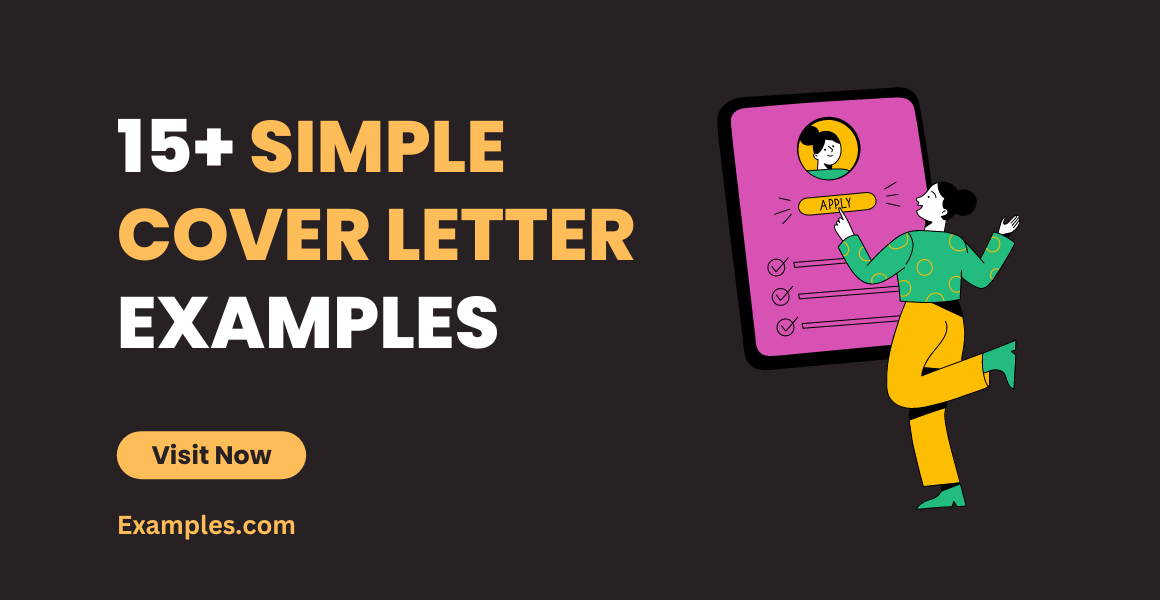
Looking for an effective way to make a strong impression on potential employers? Our guide to Simple Cover Letter Examples provides you with clear and concise templates that you can easily adapt to fit your needs. Whether you’re a seasoned professional or just starting out, these examples will guide you through crafting a cover letter that showcases your skills and experiences. Learn how to use these simple examples to open doors to new career opportunities!
What is the Best Example of Simple Cover Letter?
A simple cover letter should be clear, concise, and targeted towards the specific job you’re applying for. Here’s a universally applicable example:
Dear [Employer’s Name],
I am writing to apply for the [Job Title] position at [Company Name] as advertised. With my strong background in [Relevant Field or Skills], I am confident that I would be a strong fit for this role.
At [Previous Company or Role], I [describe a key achievement or responsibility that showcases relevant skills]. I am keen to bring this level of commitment and drive to [Company Name].
Thank you for considering my application. I look forward to the possibility of discussing this opportunity further.
Sincerely, [Your Name]
This cover letter is succinct, direct, and focuses on relevant experience and skills. Remember, the best simple cover letter is one that is tailored to the job description and highlights your unique qualifications.
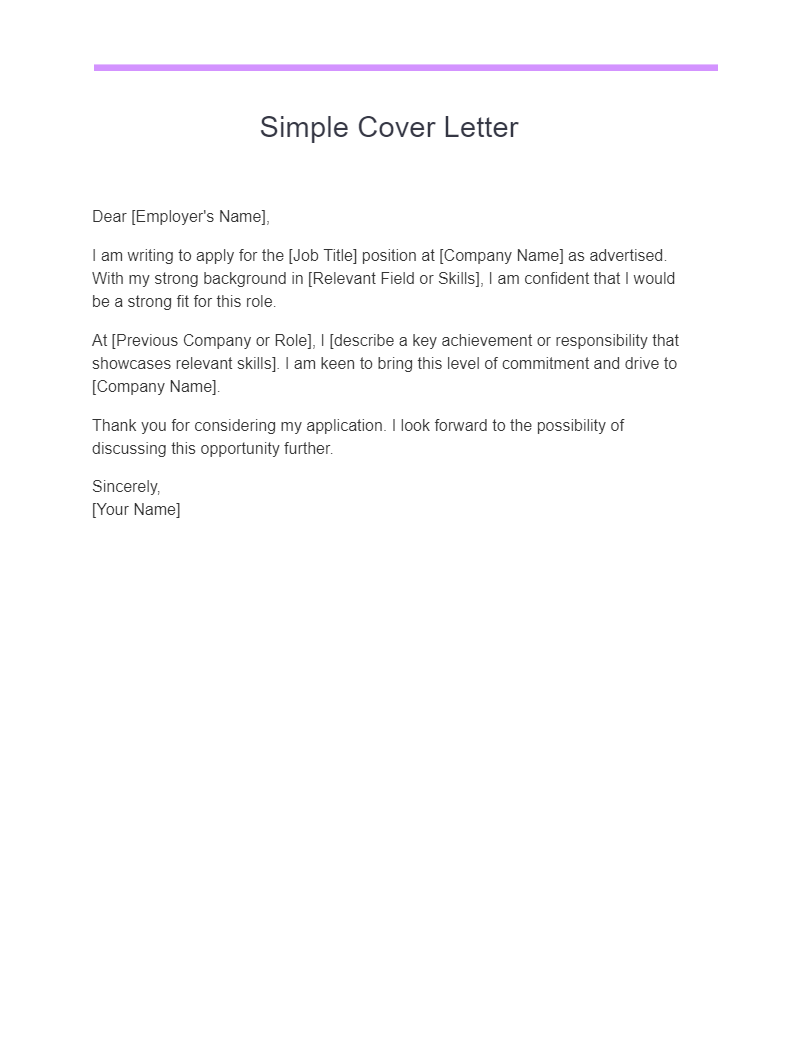
Size: 24 KB
Free Simple Cover Letters to Copy & Paste
1. simple cover letter for beginners example.
Navigate the job market with ease using our beginner-focused cover letter, designed to highlight foundational skills and an eagerness to learn.
As a motivated individual stepping into the professional world, I am interested in the [Job Title] role at [Company Name]. My academic experiences and enthusiasm for [Industry or Field] make me a strong candidate.
I am eager to apply my knowledge in a practical setting, learn from experienced professionals, and contribute to your team. I appreciate your consideration and look forward to discussing this opportunity further.
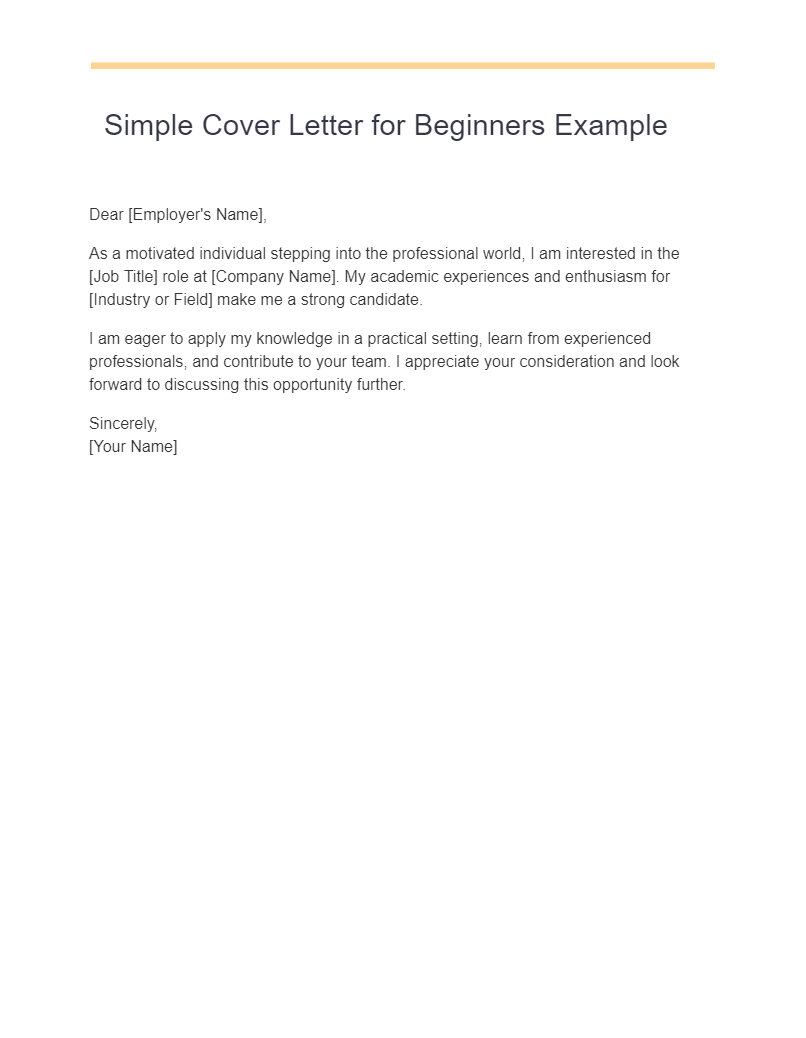
2. Simple Cover Letter for a Company Example
Tailor your application to the company of your dreams with our succinct cover letter, emphasizing alignment with corporate values and goals.
I am excited to apply for the open position at [Company Name], a company I have long admired for its [mention something you appreciate about the company]. I believe that my [mention relevant skills or experiences] align well with your team’s needs.
I am confident that I can contribute positively to your company, and I am eager to bring my skills to your team.
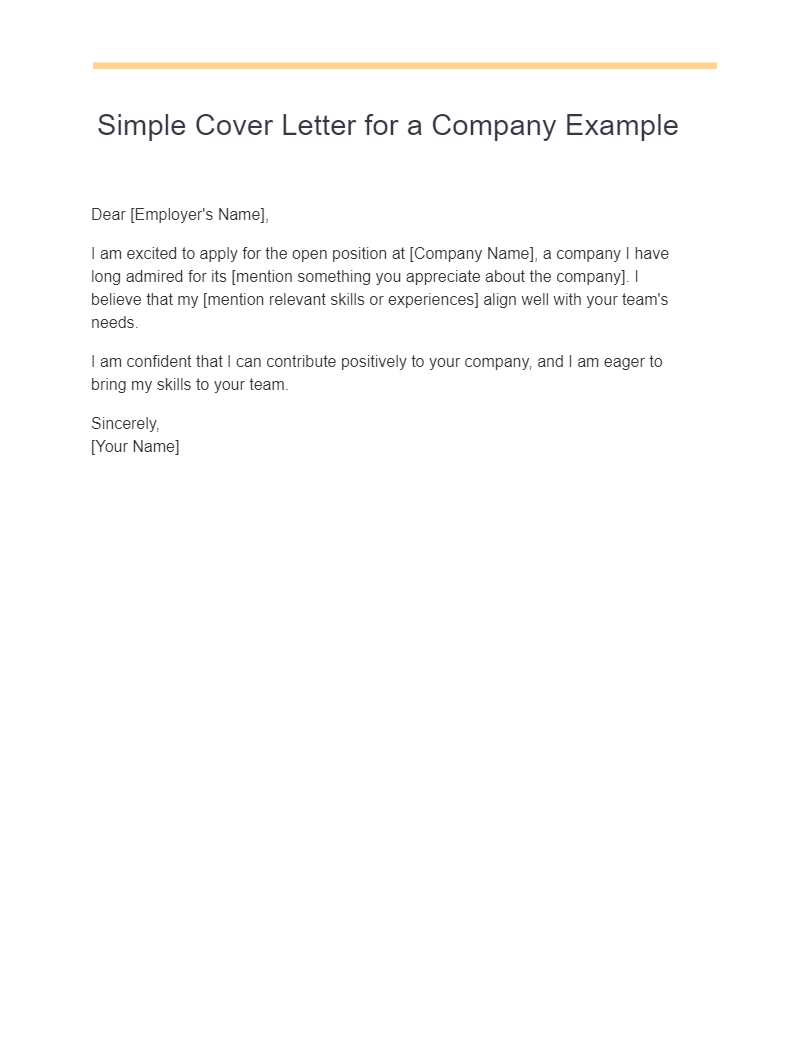
Size: 23 KB
3. Simple Cover Letter for any position Example
Display your versatility with our universal job cover letter example, crafted to showcase skills relevant across various roles.
I am eager to bring my unique set of skills and experiences to any role within your organization. Having worked in diverse roles, I have developed a versatile skillset and an adaptable mindset.
My passion for excellence, combined with my ability to collaborate and adapt, would make me a valuable addition to your team.
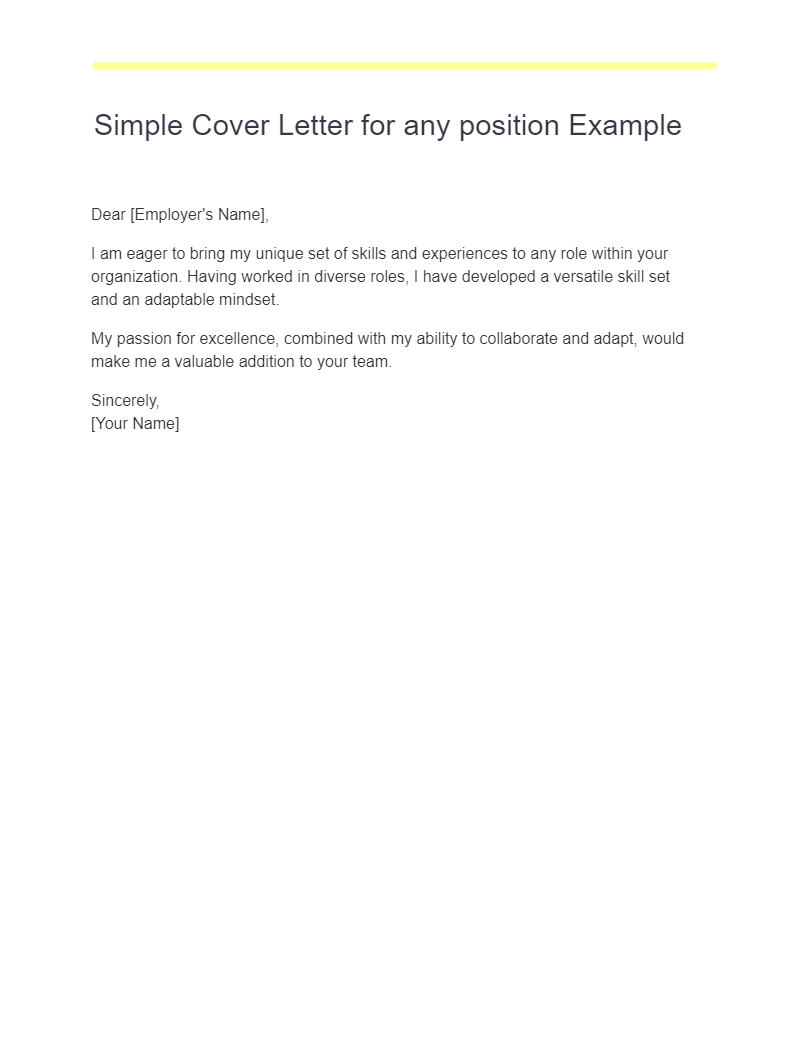
4. Simple Cover Letter for Students Example
Dive into the professional realm with our student-centric cover letter , emphasizing academic achievements and extracurricular involvement.
As a dedicated student studying [Your Major], I am excited to apply for the [Job Title] position at [Company Name]. I am keen to apply the knowledge I have gained in my coursework to a real-world setting.
My academic achievements, coupled with my involvement in [mention any relevant clubs, organizations or jobs], have prepared me well for this role.
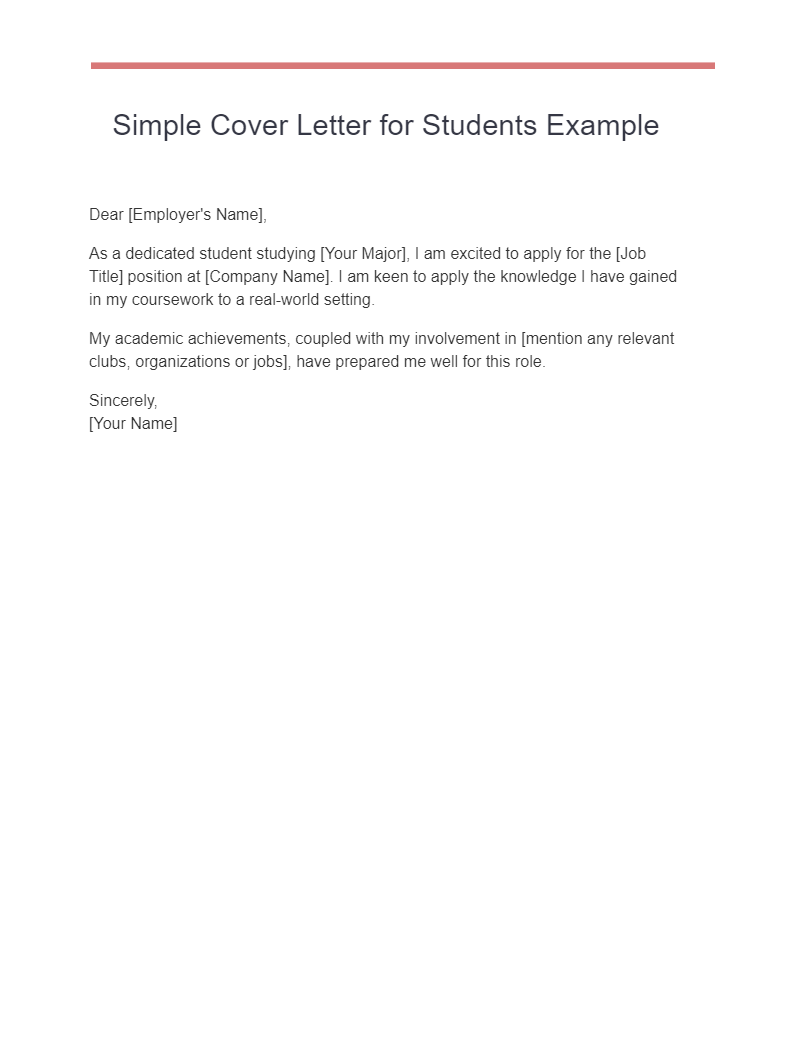
Size: 25 KB
5. Simple Cover Letter for Internship Example
Propel your learning journey with our internship cover letter , underscoring a keen desire for hands-on experience and growth.
I am writing to express my interest in the internship opportunity at [Company Name]. I am currently pursuing a [Your Degree] in [Your Major], and I believe this internship aligns perfectly with my academic and career goals.
I am excited about the opportunity to learn from experienced professionals and contribute to your team.
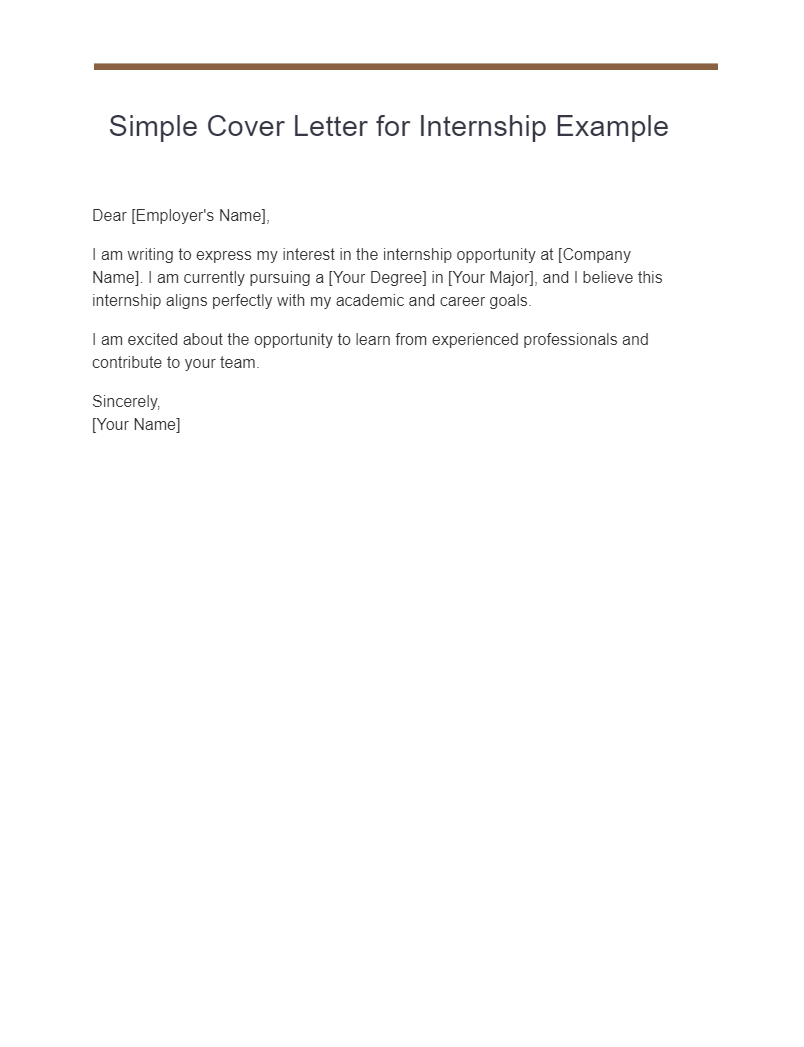
6. Simple Cover Letter for General Worker Example
Highlight your adaptability and dedication with our general worker cover letter, tailored for those with diverse skill sets.
I am interested in the General Worker position at [Company Name]. With my diverse skill set, physical stamina, and dedication to quality work, I am confident in my ability to perform tasks efficiently and meet your team’s standards.
My experiences in similar roles have honed my ability to follow instructions, work as part of a team, and complete tasks to a high standard.
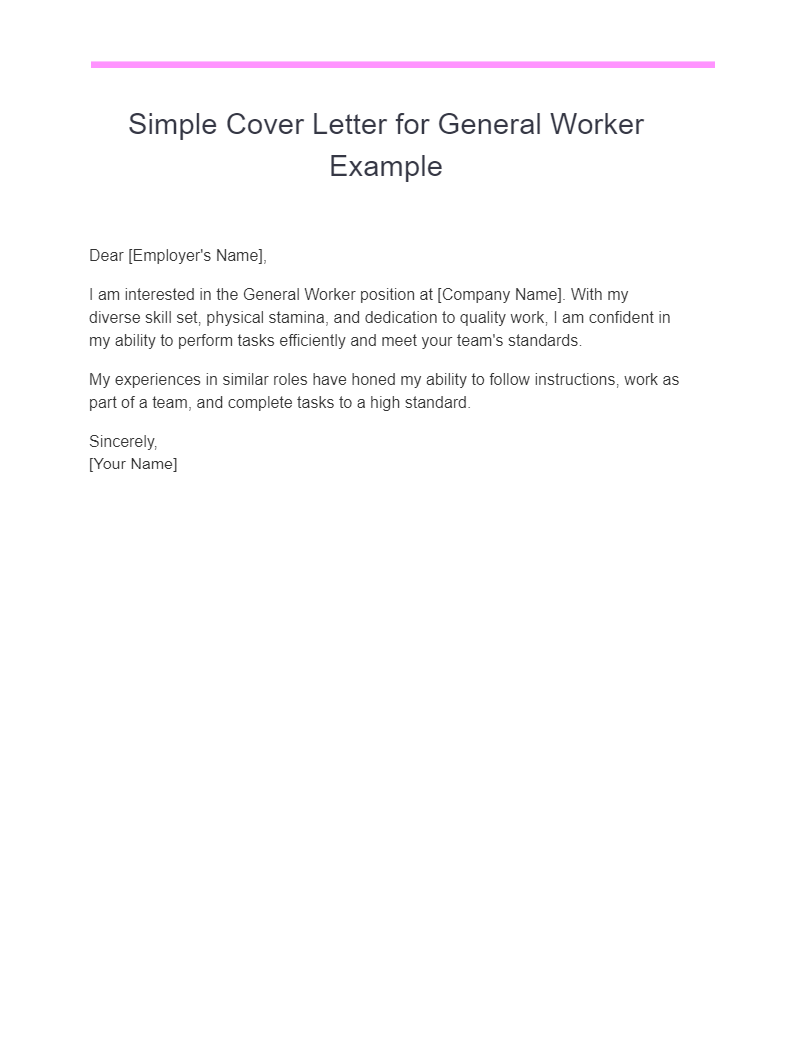
7. Simple Cover Letter for Data Entry Example
Showcase your precision and efficiency with our data entry cover letter, emphasizing attention to detail and proficiency in various software.
I am applying for the Data Entry position at [Company Name]. I possess excellent typing skills, attention to detail, and the ability to maintain high levels of accuracy, all crucial for successful data entry.
In my previous role, I consistently met and exceeded productivity goals while maintaining data integrity. I am eager to bring this dedication to your team.
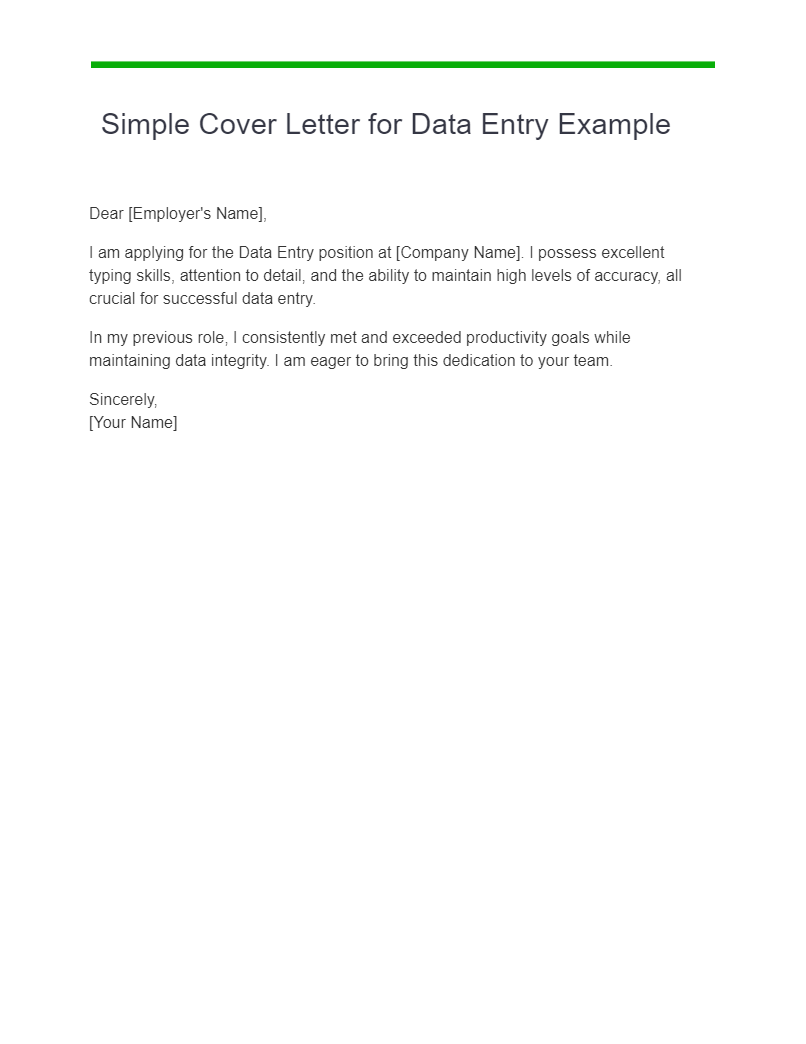
8. Simple Cover Letter for Job Application Example
Apply with confidence using our basic job application cover letter , spotlighting core competencies and professional dedication.
I am writing to apply for the [Job Title] position at [Company Name]. My [mention number of years of experience or relevant skills] make me an excellent fit for this position.
I believe that my unique experiences and passion for [mention something related to the job or industry] would make a positive impact on your team.
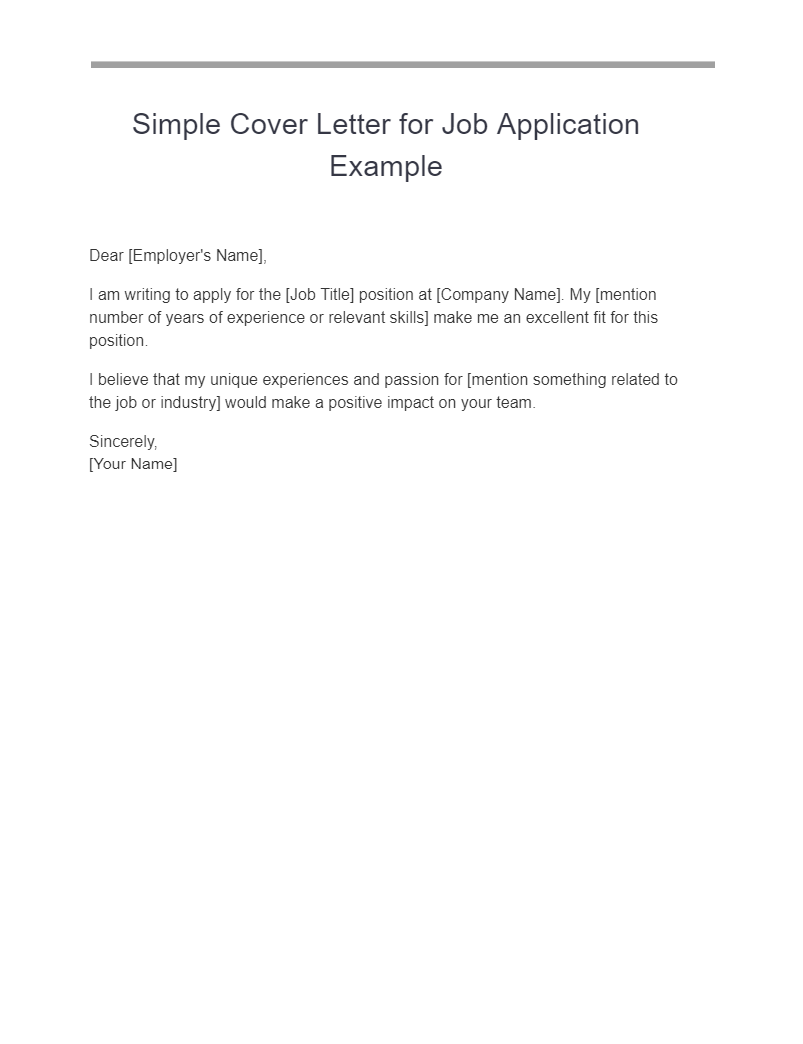
9. Short & Simple Cover Letter Example
Convey your credentials swiftly with our short cover letter , perfect for making a lasting impression in seconds.
I am interested in the [Job Title] position at [Company Name]. With my [mention key skills or experience], I am confident in my ability to contribute to your team.
I look forward to potentially discussing this opportunity further.
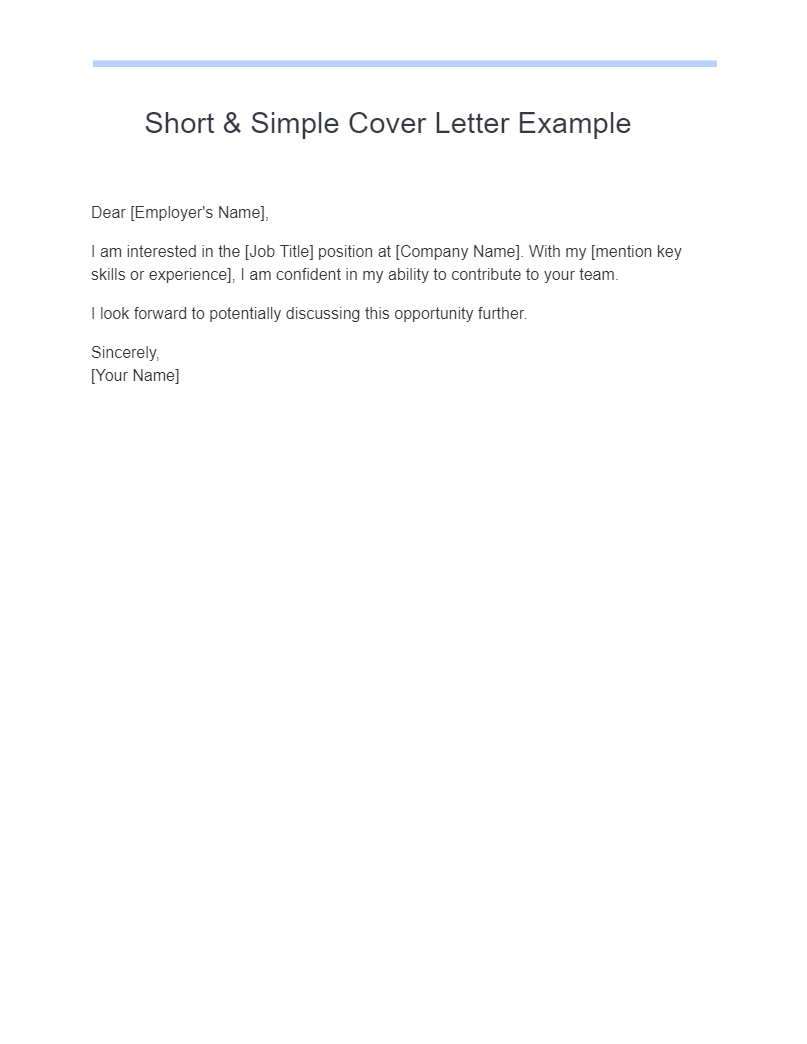
10. Simple Cover Letter for Job Vacancy Example
Elevate your candidacy for any open role with our job vacancy cover letter, stressing alignment with the specific position’s needs.
Upon learning of the job vacancy for the [Job Title] role at [Company Name], I was eager to submit my application. I am confident that my [mention key skills or experiences] align with the requirements of this role.
I am excited about the possibility of contributing to your team and achieving your company’s goals.
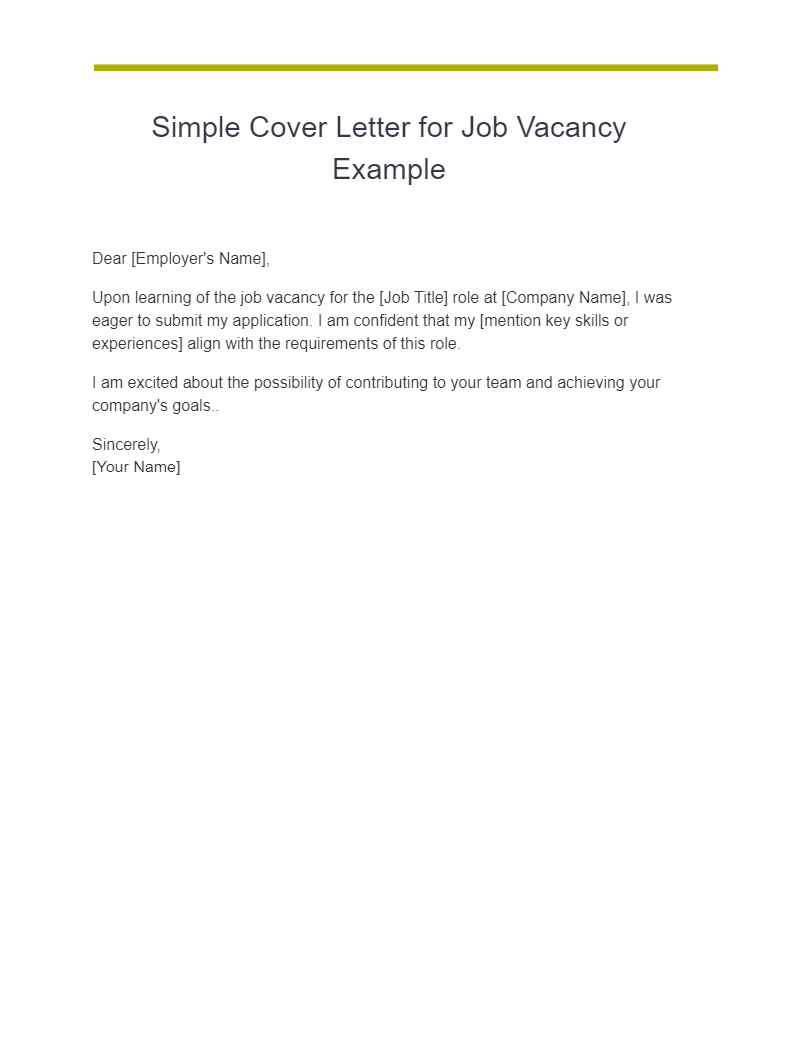
Size: 188 KB
11. Simple Cover Letter for Customer Service Example
Engage potential employers with our customer service cover letter , highlighting your commitment to stellar client interactions and problem-solving.
I am writing to apply for the Customer Service role at [Company Name]. My experience in customer-facing roles, combined with my communication skills and problem-solving abilities, makes me a strong candidate for this position.
In my previous role, I consistently provided high-quality service, resolving customer issues effectively and building strong customer relationships.
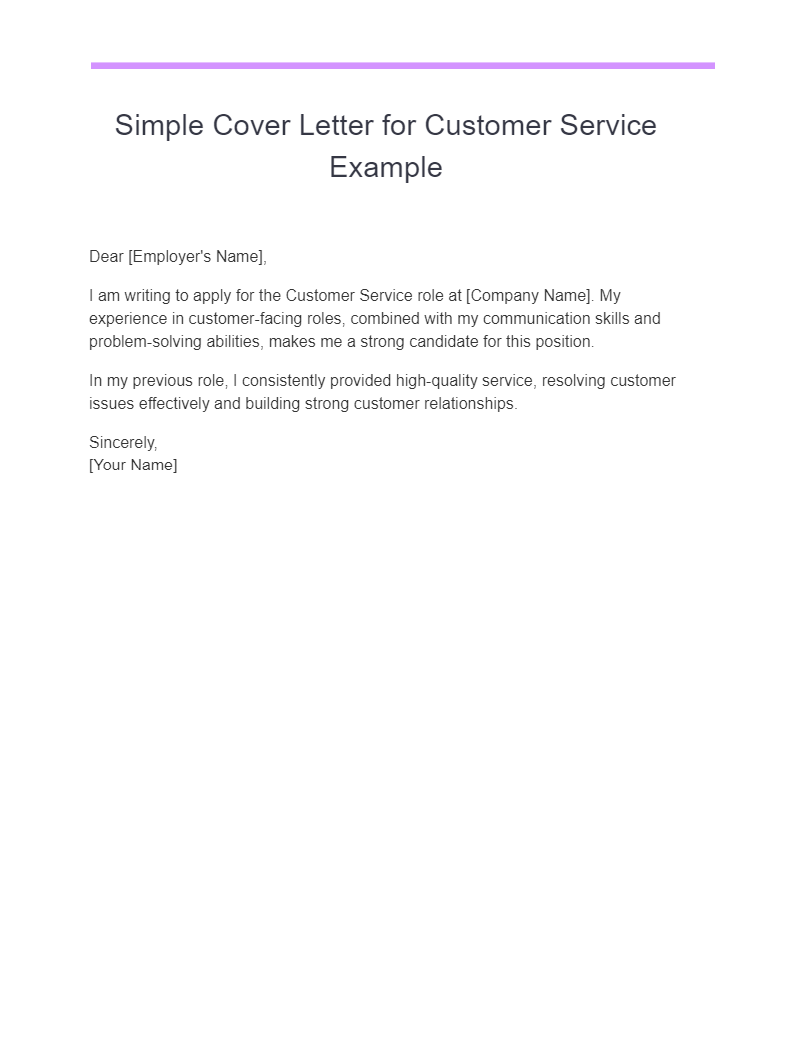
12. Simple Cover Letter for First Job Example
Jumpstart your career with our first job cover letter, focusing on enthusiasm, potential, and readiness to contribute.
As a highly motivated individual, I am eager to apply for the [Job Title] role at [Company Name] as my first formal employment. Although I lack formal work experience, I have developed strong [mention relevant skills] through [mention relevant academic or extracurricular activities].
I am excited about the possibility of contributing to your team and gaining practical experience in the workforce.
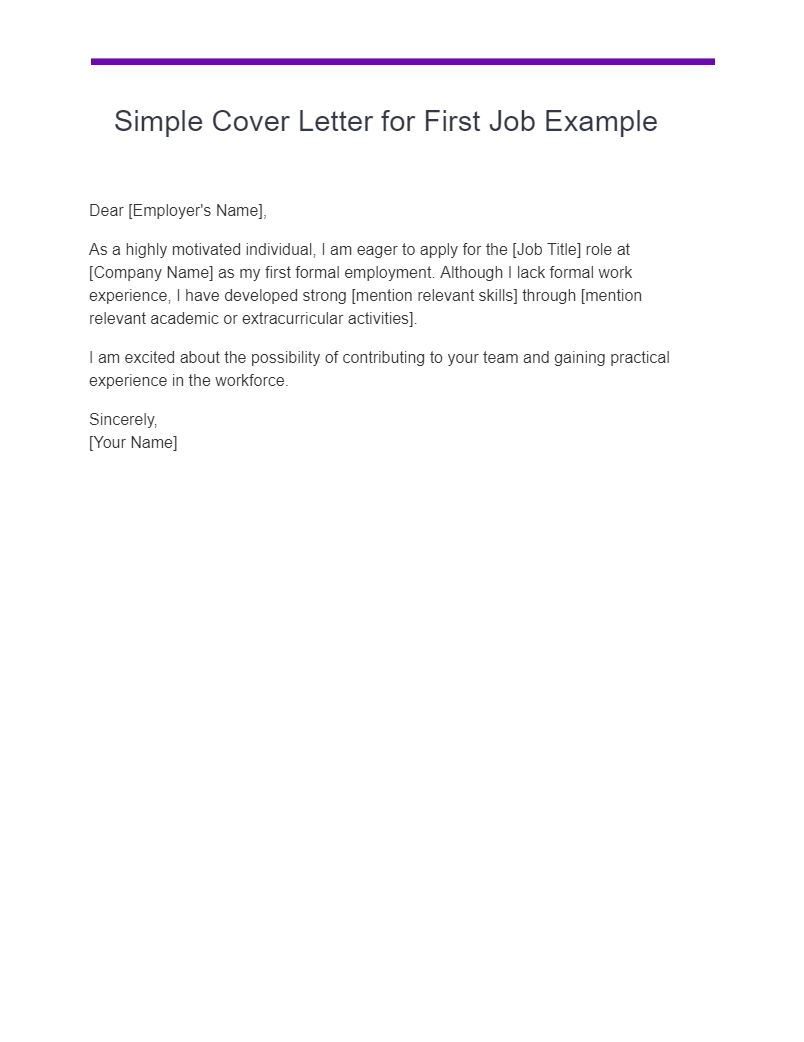
13. Simple Cover Letter for Fresh Graduate Example
Stand out as a recent graduate with our fresh graduate cover letter , spotlighting academic accomplishments and readiness for the professional sphere.
As a recent graduate from [Your University Name] with a degree in [Your Major], I am excited to apply for the [Job Title] position at [Company Name]. My academic background, combined with my enthusiasm for [mention something related to the job or industry], makes me a strong candidate for this role.
I am keen to bring my knowledge, skills, and passion to your team.
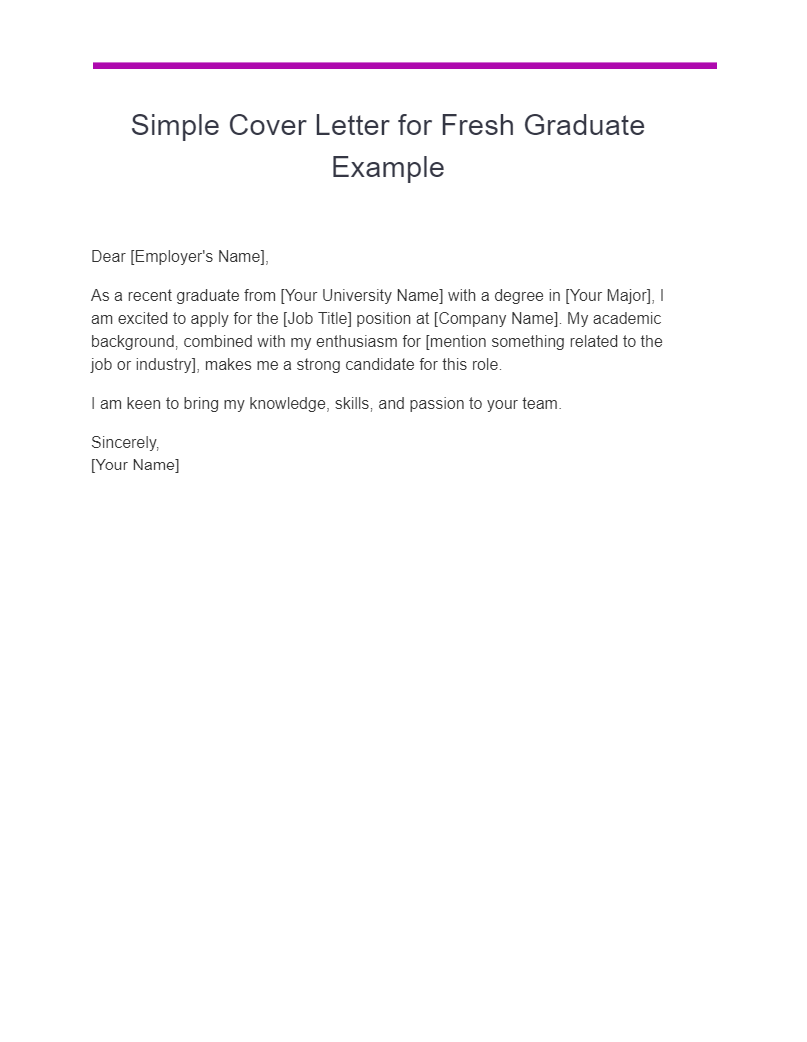
14. Simple Cover Letter for Entry Level Example
Begin your career trajectory with our entry-level cover letter, emphasizing transferable skills and a growth mindset.
I am writing to apply for the Entry Level [Job Title] role at [Company Name]. Although I am new to the field, I have a strong academic background in [relevant field], and I am eager to apply what I have learned in a practical setting.
My ability to learn quickly, adapt, and contribute would make me a valuable addition to your team.
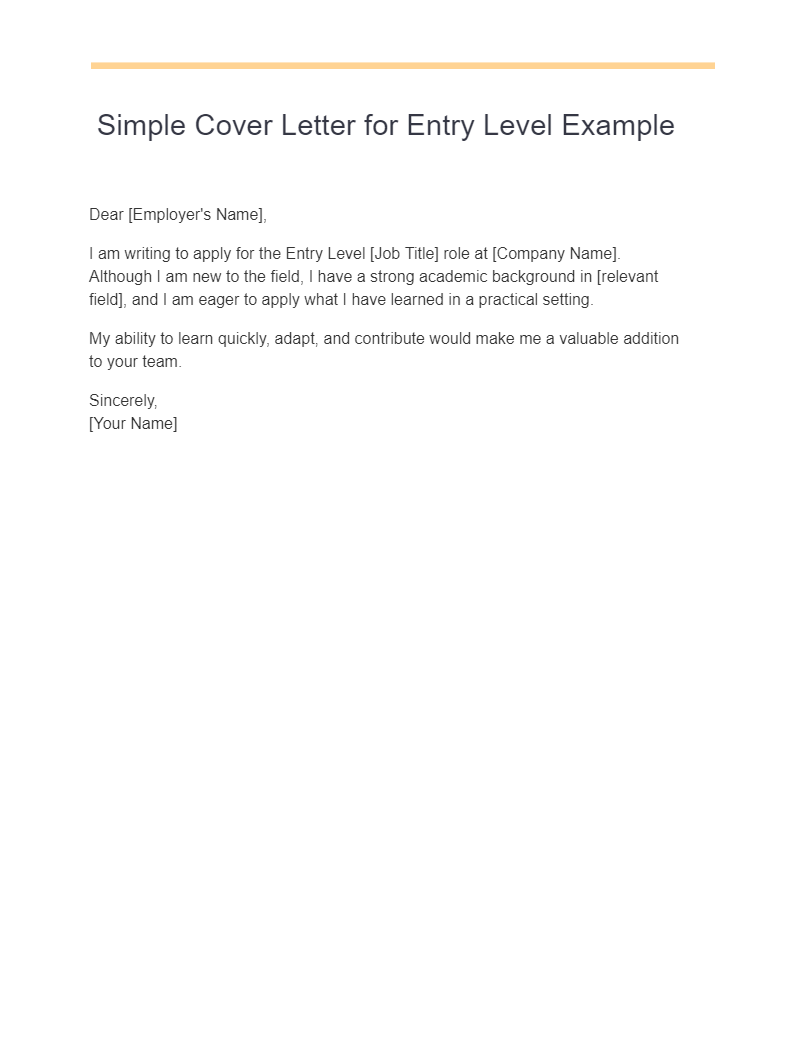
15. Simple Cover Letter for Teacher Example
Illuminate your passion for education with our teacher-focused cover letter , underscoring pedagogical strategies and classroom management prowess.
I am applying for the Teacher position at [School Name]. With my educational background in [mention your major or teaching area] and my experience in teaching [mention grade levels or subjects you’ve taught], I am confident in my ability to contribute positively to your school.
I am passionate about education and dedicated to fostering a positive learning environment for students.
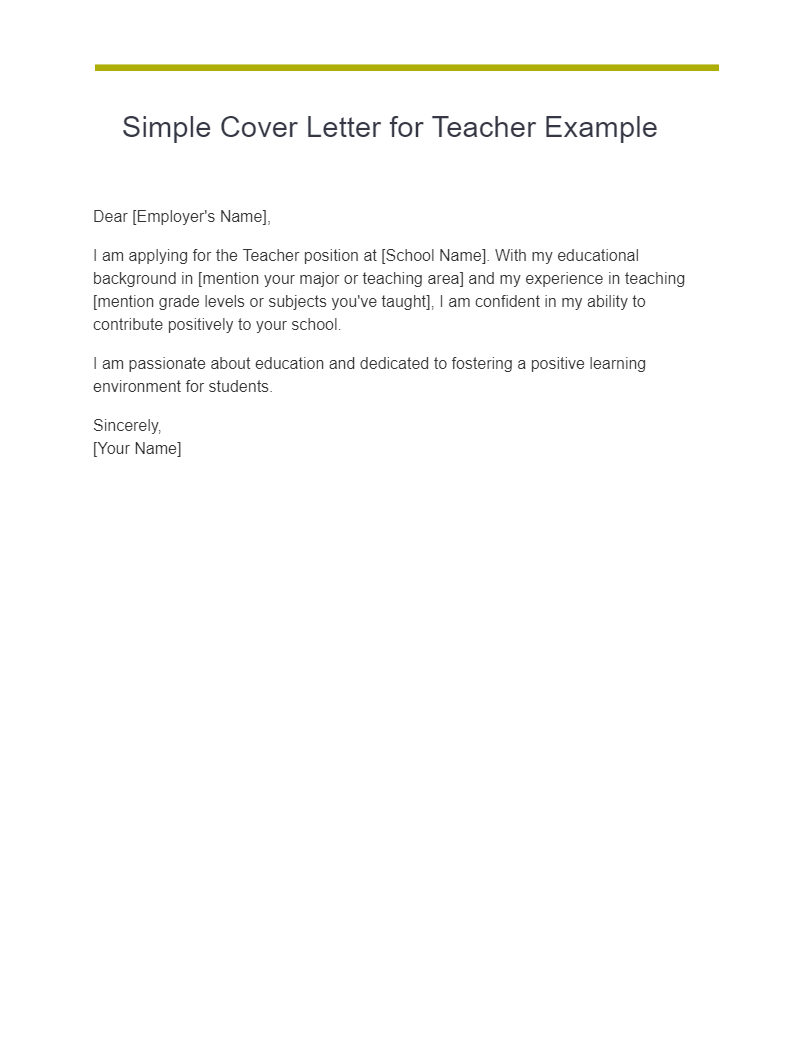
16. Simple Cover Letter for Nursing Example
Highlight your compassion and medical knowledge with our nursing cover letter , tailored to showcase care delivery and patient rapport.
I am interested in the Nursing position at [Healthcare Facility Name]. With my nursing degree and experience in providing compassionate care, I am confident in my ability to contribute to your healthcare team.
I am committed to delivering high-quality patient care and look forward to the possibility of working at your esteemed facility.
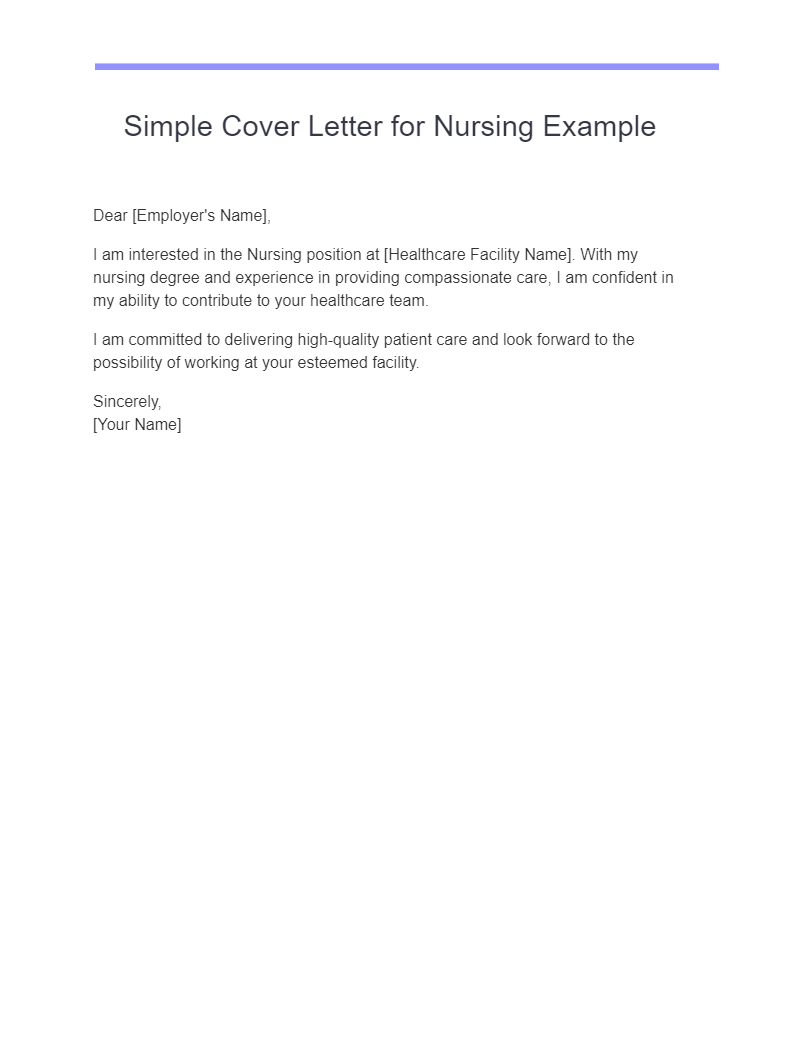
17. Simple Cover Letter Format Example
Navigate the basics of cover letter writing with our format guide, offering a clear structure that can be adapted for various roles.
I am writing to apply for the [Job Title] role at [Company Name]. My unique blend of experiences and skills makes me a suitable candidate for this position.
In my previous role at [Previous Company], I [mention a significant achievement or responsibility]. I am eager to bring this dedication and professionalism to your team.
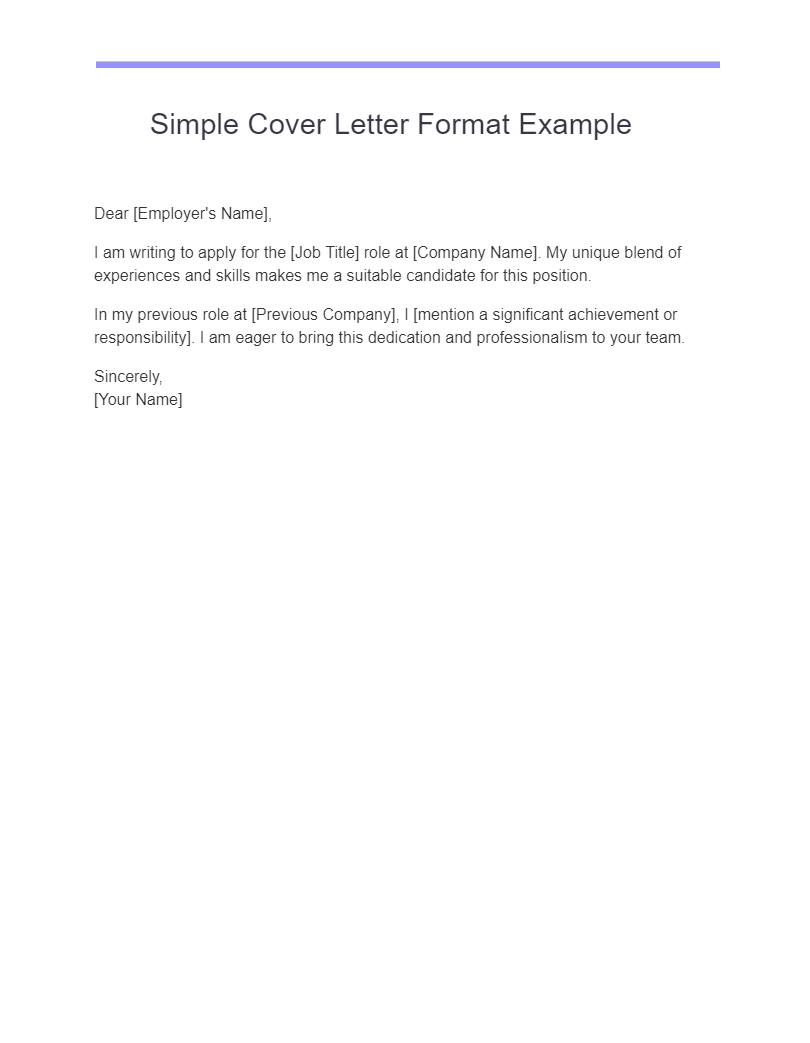
How to Use Simple Cover Letter?
Step 1: choose the appropriate example.
Based on the type of job you’re applying for, the industry, your experience level, and other specific circumstances, select the cover letter example that best fits your situation. The key is to choose a template that allows you to highlight your strengths and personal experiences.
Step 2: Personalize the Content
Once you’ve chosen a example, replace the placeholders with your information. This includes the employer’s name, your name, the company name, job title, your educational background, previous work experiences, and any relevant skills or achievements. The goal is to make the cover letter as personalized and specific as possible.
Step 3: Tailor to the Job Description
Review the job description carefully and tailor your cover letter to match the requirements. Highlight how your skills and experiences make you a suitable candidate for the position. Use keywords from the job description to show the hiring manager that you’re a perfect fit for the role.
Step 4: Proofread and Edit
Before sending the cover letter, take the time to proofread it for any spelling or grammatical errors. Also, make sure the letter flows well and is free of any awkward phrasing. Consider having a friend or mentor review it for a fresh perspective.
Step 5: Send Your Cover Letter
Finally, attach your cover letter to your job application as instructed in the job posting. This could mean attaching it as a separate document, or pasting it into the body of an email or a form on the company’s website. Always follow the employer’s instructions for submitting your cover letter to ensure it reaches the right person and isn’t overlooked.
Remember, a cover letter is your opportunity to make a strong first impression on a potential employer. By selecting the right template, personalizing it, tailoring it to the job description, and carefully proofreading it, you can make your application stand out from the rest.
Text prompt
- Instructive
- Professional
Write a cover letter for a college student applying for an internship at an educational technology company
Form a cover letter for a high school student seeking a part-time job at a local bookstore.

IMAGES
VIDEO
COMMENTS
A cover letter is a document that accompanies your resume and briefly explains your interest in a particular job posting. The elements of a cover letter are similar to those of a letter of interest. However, a cover letter refers to a specific job that the company has advertised. Your cover letter helps your resume stand out and should make the ...
The main difference between the two is: a cover letter is used to apply for a job opening. a letter of interest is used to express interest in working at a company that isn't necessarily hiring. Picking which type of letter to use is simple: If you're applying for an open job, write a cover letter. When writing, target the hiring manager ...
Letter of interest vs. cover letter. So what's the difference between a letter of interest and the probably-more-familiar cover letter? Basically, a cover letter targets a specific job opening and a letter of interest (sometimes called a letter of intent) expresses a desire to work for a specific company even though you haven't seen a job ...
A cover letter is typically written in response to a specific job opening, where you highlight your qualifications and tailor your experiences to the job requirements. Meanwhile, a letter of interest (also known as a letter of intent) is written when there isn't a specific job advertisement, but you're interested in a particular company or ...
The primary difference between a cover letter and a letter of interest is the purpose for which the letter is written. A letter of interest is sent as an open offer and indicates that you are interested in working for a specific company in a potentially available role that matches your skillset and experience. A cover letter, on the other hand ...
Paragraph 3: Encourage the reader to reach out to you. The final paragraph of your letter of interest is referred to as the call to action because you're calling on the reader to act. In this case, you want them to call you in for an interview. Make things easy for the reader. Provide them with your contact details.
Whatever the reason, sending a letter of interest can be a unique way to get noticed and tap into the hidden job market. A cover letter is a brief (usually one page) letter that you write to a hiring manager that is sent with your resume for a specific job opening. This letter should outline your skills, experience, and achievements relevant to ...
A cover letter is for advertised jobs. A letter of interest is for jobs that don't exist or haven't been advertised. An LOI is shorter, with a brief three paragraphs. Cover letters mention the job ad and requirements in paragraph #1. Letters of interest focus instead on good things about the business.
Letter of Interest vs. Cover Letter. The main differences between a letter of interest and a cover letter are their purpose and approach. A cover letter is typically submitted as a supporting document in response to a specific job posting, while a letter of interest is unsolicited and proactive.
The purpose of a cover letter is to accompany a resume when applying for a job. Since a cover letter is intended for an open position, it does not require an explanation for why it was sent. That said, it holds pretty much the same information contained in a letter of interest including your best qualifications, an explanation of why you would ...
The content: letter of interest vs. cover letter The difference between an expression of interest vs. cover letter occurs mostly in the first paragraph. In one, you are introducing yourself and letting the employer know you're interested and either know they may have an opening soon or are aware there is no opening. In a cover letter, you are ...
Cover letters are for companies actively hiring for a certain position. Letters of interest are for companies that aren't actively hiring. A letter of interest is for inquiring about potential roles for a certain company that you'd love to work for. It tells hiring managers how your skills, experience, and aspirations can make you valuable ...
Use this letter of interest sample to craft your own: Subject line: Nayla Martínez - Sculptor & Screenwriter Looking to Contribute My Experience. Feb. 18, 2024. Dear Julia Rodriguez, I recently saw your studio's short film "Laika" at the Stop Motion Festival and left the festival entirely in awe of your team's work.
In many ways, a letter of interest is like a cover letter. However, when it comes to a letter of interest vs. cover letter, there are differences, too. Generally speaking, cover letters typically target specific, open jobs. With a letter of interest, you're reaching out even though there isn't an advertised vacancy.
5 steps on how to compose a letter of interest vs. a cover letter. Follow these five steps to write a letter of interest and a cover letter: 1. Learn more about the firm. Conduct a background check on the corporation you wish to work for to understand its vision. It's also advisable to know the exact individual to address your letter to instead ...
Letter of interest vs cover letters. A common misconception job seekers have is that a letter of interest is the same as a cover letter. Although similar, you would use these two documents at different stages of your job search. A cover letter is strictly a job application document that companies request you submit with your resume. A cover ...
The difference between a statement of interest vs. a cover letter lies in their purpose. Think of the letter of interest as a cold call for a job that is not being advertised, whereas a cover letter should go with a job application for an open job vacancy. In many cases, you need to demonstrate your passion as well as your interest in a specific position to further impress the hiring manager ...
Purpose: A letter of interest is used to introduce oneself to an employer and express admiration for a company or organization, whereas a cover letter is tailored to the specific job one is applying for. Length: Letters of interest tend to be shorter than cover letters, as they are focused on introducing oneself rather than providing detailed ...
How to Write a Cover Letter. If you think a cover letter suits your case better, follow these steps as you write your own: 1. Introduce yourself. Similar to how you must write an intro for your letter of interest, make sure your cover letter has the basic details of who you are and the role you're applying for. 2.
The structure of your letter of interest. Header - include your name, and contact details (email, phone number, and address). Also, the contact's name, job title, and company name. Don't miss out on the date. Greeting - take the time to find out who you're writing to and always personalize your salutation.
A letter of interest is written to express your interest in working for a company before the company advertises a job opening. Whereas, a cover letter is written as an accomplice to support your resume for a specific job vacancy at a company. So, to address the question directly, a letter of interest is not the same as a cover letter.
Purpose: To set the tone for the rest of your letter and encourage the hiring manager to read the rest of your cover letter more closely. 4. Main body paragraph (make your case) The main body of your cover letter is where you should expand on your qualifications, skills, and experience - the details that make you a great fit for the position.
17. Simple Cover Letter Format Example. Navigate the basics of cover letter writing with our format guide, offering a clear structure that can be adapted for various roles. Dear [Employer's Name], I am writing to apply for the [Job Title] role at [Company Name]. My unique blend of experiences and skills makes me a suitable candidate for this ...